I finished my last Spanish class on Friday! In total, I spent 4 1/2 months taking classes. And sometime in that period I learned a new language and became pretty proficient at using it. How amazing is that?! That said, I'm definitely not fluent. That word means different things for a lot of people, so this is how I'm defining it: speaking a language quickly, with very little difficulty, and with few grammatical errors. I associate this level with, say, being certified as a medical translator. For me to get to that point would take another six months of Spanish immersion, I would guess. But honestly I am happy with where I am at right now: depending on the speaker I understand 75-100% of what they are saying, and I can speak well enough that conversing with patients in a medical setting goes pretty well.
I will still be in the clinic on Tuesday, Wednesday and Friday mornings, and also will be working on finishing up the medical program orientation manual that I and a couple other folk are making, but without my afternoons taken up by Spanish class I have a feeling this week will be a welcome respite from the business of the previous months. I plan on spending my free time watching movies in Spanish, baking, wandering around the city, chatting with the other Guatemalans in my apartment building, and planning the two weeks of travel I'll be doing with Caleb between the 20th and the 6th. All in all, a pretty tranquilo week :)
Sunday, December 12, 2010
Monday, December 6, 2010
Week 19: México y no mucho más
Being a passport-carrying gringo from the United States automatically gives me a 90-day visa in Guatemala. However the last time I left Guatemala was when I visited Caleb in Canada, which was surprisingly almost 90 days ago. Since trying to leave Guatemala with an expired visa is bad news bears, I went to Mexico last week. The objective: to renew my visa, set to expire on the 26th of December. The mission: visa run to Ciudad Hidalgo, Mexico, four hours away from Quetzaltenango.
Technically, renewing your visa means leaving the country for at least 72 hours, and upon reentering the country you get a new 90-day visa. Fortunately, the 72-hour rule is mostly disregarded, allowing you to do your visa run in a day if you'd like, thus not having to pay for two nights in a hostel/hotel. Unfortunately, most of the countries surrounding Guatemala (El Salvador, Nicaragua and Honduras) are in this CA-4 pact, where a visa acquired in one of countries is valid in all of the others. It is a nice idea, but it also means you can't renew your visa by crossing any of their borders. So that left me with the options of traveling to Mexico (cheap), Belize (expensive), or something really far away (really expensive). Since I have very little money, the choice was an easy one.
I essentially did this trip in a day. I got up at 4:30 to walk over to the Minerva bus terminal where all the camionetas line up. There I found a direct bus to Tecún Umán, the town on the Guatemalan side of the border. I paid $3 for the trip, and four hours sitting four-to-a-school-bus-seat later, I was en la frontera. For $1.25 a guy on a tricycle-rikshaw thingie pedaled me from the bus terminal to the border proper, where I got an exit stamp from a friendly female customs officer for $1.25. Then I walked across the bridge into Ciudad Hidalgo, Mexico, spent a couple hours frittering away my time in an internet cafe ($1), got bored, ate a couple empanadas ($0.50) walked back across the bridge, got an entry stamp from the same customs officer ($1.25), traveled via rickshaw ($1.25) and bus ($3) in reverse order back to Xela, getting back to the Minerva bus terminal at about 7:00pm. Sweaty, exhausted, and with a stress+dehyrdation headache (it is /not/ a good idea to be hydrated during camioneta bus trips, since they never stop for pee breaks), I collapsed in bed at 8pm, waking up sometime around 9:30am the next day.
My time in Mexico was short lived (about two hours), but I did learn some things, namely:
-Mexican men, surprisingly, are much more prone to cat calling than Guatemalan men.
-It is hot and miserable in Ciudad Hidalgo, but that means they make really awesome ice cold fruit punches.
-The randomly selected empanadas that I ate for lunch in Mexico were by far better than any empanada I've eaten in Guatemala, lending more credence to the theory that Guatemalan food is sadly fairly bland.
So now I have a renewed visa, good until well after I leave Guatemala to head back to the states! And heading back to the states is approaching very quickly - Caleb is going to be in Xela in less than two weeks. Wow.
Technically, renewing your visa means leaving the country for at least 72 hours, and upon reentering the country you get a new 90-day visa. Fortunately, the 72-hour rule is mostly disregarded, allowing you to do your visa run in a day if you'd like, thus not having to pay for two nights in a hostel/hotel. Unfortunately, most of the countries surrounding Guatemala (El Salvador, Nicaragua and Honduras) are in this CA-4 pact, where a visa acquired in one of countries is valid in all of the others. It is a nice idea, but it also means you can't renew your visa by crossing any of their borders. So that left me with the options of traveling to Mexico (cheap), Belize (expensive), or something really far away (really expensive). Since I have very little money, the choice was an easy one.
I essentially did this trip in a day. I got up at 4:30 to walk over to the Minerva bus terminal where all the camionetas line up. There I found a direct bus to Tecún Umán, the town on the Guatemalan side of the border. I paid $3 for the trip, and four hours sitting four-to-a-school-bus-seat later, I was en la frontera. For $1.25 a guy on a tricycle-rikshaw thingie pedaled me from the bus terminal to the border proper, where I got an exit stamp from a friendly female customs officer for $1.25. Then I walked across the bridge into Ciudad Hidalgo, Mexico, spent a couple hours frittering away my time in an internet cafe ($1), got bored, ate a couple empanadas ($0.50) walked back across the bridge, got an entry stamp from the same customs officer ($1.25), traveled via rickshaw ($1.25) and bus ($3) in reverse order back to Xela, getting back to the Minerva bus terminal at about 7:00pm. Sweaty, exhausted, and with a stress+dehyrdation headache (it is /not/ a good idea to be hydrated during camioneta bus trips, since they never stop for pee breaks), I collapsed in bed at 8pm, waking up sometime around 9:30am the next day.
My time in Mexico was short lived (about two hours), but I did learn some things, namely:
-Mexican men, surprisingly, are much more prone to cat calling than Guatemalan men.
-It is hot and miserable in Ciudad Hidalgo, but that means they make really awesome ice cold fruit punches.
-The randomly selected empanadas that I ate for lunch in Mexico were by far better than any empanada I've eaten in Guatemala, lending more credence to the theory that Guatemalan food is sadly fairly bland.
So now I have a renewed visa, good until well after I leave Guatemala to head back to the states! And heading back to the states is approaching very quickly - Caleb is going to be in Xela in less than two weeks. Wow.
Saturday, November 27, 2010
Week 18: Acción de Gracias
Thanksgiving in Guatemala! I was half assuming I'd be eating the usual beans, eggs, and tortillas, but my classmates who cooked the dinner really pulled out all the stops. We had green beans, cranberry sauce, cranberry can, mashed potatoes, stuffing, turkey, squash pie, pumpkin pie, /and/ mojitos.
The most interesting aspect of our Guatemalan Thanksgiving was that we killed our own turkey. We originally were going to buy one from the mercado, but as folks were leaving to do so, Doña Lety, the cleaning lady, overheard us and said that she had a turkey at her house that she could sell, so we bought it.
I was working in the clinic on Wednesday morning when the cooks got back with the turkey, and they called me upstairs so I could take pictures for them. Those present included Paty, one of the teachers at Pop Wuj and a battle-hardened turkey-slayer, who was holding a large butcher's knife that she had just sharped on some cement steps. Also present were the two cooks for the evening, who were to hold down the turkey while Paty killed it. And there in the middle of the patio, feet bound but resting seemingly tranquilly on its belly, was our turkey.
After I had gotten the pile of cameras in working order*, everyone got ready. The cooks held the turkey down, Paty placed its neck over a drain, and with two knife strokes cut off the head. It was as bloody as I was expecting, but it still was shocking to witness. Then, right around the time we were waiting for the nerves in the turkey's body to settle down, Doña Lety's little daughter came in and informed us that the turkey's name was Hector, and it had been her pet. Ack! Some kids learn life's cruel lessons earlier than others, I guess.
This had an interesting effect on the way I felt about eating Thanksgiving dinner: even after Hector was defeathered, gutted, boiled, filled with stuffing, and baked until crispy golden brown, in the end looking very much like a typical Thanksgiving turkey, I couldn't help but remember the living bird. With Hector's life in mind, instead of being in a hyper wow-look-at-all-this-awesome-food state, I was much more aware of how I was connected, in a very circle-of-life-tree-hugging sense, to every dish we had prepared for that night. It actually made me feel so thankful for the food in front of me that I found it impossible to overeat. I hope I can repeat that feeling in subsequent Thanksgivings, because it felt more in accordance with the essence of Thanksgiving that what I had experienced previously.
Other than Thanksgiving I spent last week working in the clinic, studying, running, working on my research proposal, and cooking. Lately I've gotten to do a lot of talking in clinic because I'm one of the better Spanish-speakers at the moment. This in itself is amazing to me, given that in July I couldn't say more than ten words of Spanish. I still have /so/ much room for improvement, but I'm happy with how far I've come after 4.5 months of school, and spending a few hours interviewing and examining patients is a great way to keep my Spanish on the up-and-up. I've been asked where it (my Spanish) is at these days, and it is hard to quantify, but perhaps a couple examples will explain:
I'm starting to understand conversations/movies/radio chatter going on in the background without trying. It means that snippets of conversation will intrude on my thoughts while I'm, say, walking down a street, but this has had the pleasant effect of making me feel more connected to Xela and the people living in it.
I no longer have to pre-translate in my head to say something simple like, "I bought two loaves of bread because they were on sale." Pretty cool considering that in the first week of school I couldn't for the life of me correctly say, "I'm Becky. What's your name?" That said, I still have a lot of trouble with hypothetical statements, reflexive verbs in general, and and, of course, using the subjunctive, but it is nice to at least to be able to say a few things in Spanish without struggling too hard :)
*I have some interesting photos of Hector, but I decided not to post them because they are quite graphic. I may put them on my blog later for intrepid folks to view, but at the moment I'd rather be sleeping :)
The most interesting aspect of our Guatemalan Thanksgiving was that we killed our own turkey. We originally were going to buy one from the mercado, but as folks were leaving to do so, Doña Lety, the cleaning lady, overheard us and said that she had a turkey at her house that she could sell, so we bought it.
I was working in the clinic on Wednesday morning when the cooks got back with the turkey, and they called me upstairs so I could take pictures for them. Those present included Paty, one of the teachers at Pop Wuj and a battle-hardened turkey-slayer, who was holding a large butcher's knife that she had just sharped on some cement steps. Also present were the two cooks for the evening, who were to hold down the turkey while Paty killed it. And there in the middle of the patio, feet bound but resting seemingly tranquilly on its belly, was our turkey.
After I had gotten the pile of cameras in working order*, everyone got ready. The cooks held the turkey down, Paty placed its neck over a drain, and with two knife strokes cut off the head. It was as bloody as I was expecting, but it still was shocking to witness. Then, right around the time we were waiting for the nerves in the turkey's body to settle down, Doña Lety's little daughter came in and informed us that the turkey's name was Hector, and it had been her pet. Ack! Some kids learn life's cruel lessons earlier than others, I guess.
This had an interesting effect on the way I felt about eating Thanksgiving dinner: even after Hector was defeathered, gutted, boiled, filled with stuffing, and baked until crispy golden brown, in the end looking very much like a typical Thanksgiving turkey, I couldn't help but remember the living bird. With Hector's life in mind, instead of being in a hyper wow-look-at-all-this-awesome-food state, I was much more aware of how I was connected, in a very circle-of-life-tree-hugging sense, to every dish we had prepared for that night. It actually made me feel so thankful for the food in front of me that I found it impossible to overeat. I hope I can repeat that feeling in subsequent Thanksgivings, because it felt more in accordance with the essence of Thanksgiving that what I had experienced previously.
Other than Thanksgiving I spent last week working in the clinic, studying, running, working on my research proposal, and cooking. Lately I've gotten to do a lot of talking in clinic because I'm one of the better Spanish-speakers at the moment. This in itself is amazing to me, given that in July I couldn't say more than ten words of Spanish. I still have /so/ much room for improvement, but I'm happy with how far I've come after 4.5 months of school, and spending a few hours interviewing and examining patients is a great way to keep my Spanish on the up-and-up. I've been asked where it (my Spanish) is at these days, and it is hard to quantify, but perhaps a couple examples will explain:
I'm starting to understand conversations/movies/radio chatter going on in the background without trying. It means that snippets of conversation will intrude on my thoughts while I'm, say, walking down a street, but this has had the pleasant effect of making me feel more connected to Xela and the people living in it.
I no longer have to pre-translate in my head to say something simple like, "I bought two loaves of bread because they were on sale." Pretty cool considering that in the first week of school I couldn't for the life of me correctly say, "I'm Becky. What's your name?" That said, I still have a lot of trouble with hypothetical statements, reflexive verbs in general, and and, of course, using the subjunctive, but it is nice to at least to be able to say a few things in Spanish without struggling too hard :)
*I have some interesting photos of Hector, but I decided not to post them because they are quite graphic. I may put them on my blog later for intrepid folks to view, but at the moment I'd rather be sleeping :)
Sunday, November 21, 2010
Week 17: Luz al final del túnel
A couple things happened this week worth sharing, although I can't say they're too exciting.
Numero uno, I tried some new fruits! (see? Very exciting week.) One was a custard apple (anona in Spanish). I think it looks like a dragon egg. Inside, as the name suggests, are a couple dozen fat shiny black seeds surrounded by creamy, custardy sections of fruit. You eat an anona by picking out a seed encased in fruit, sucking off the pulp and spitting out the seed. They're really delicious.
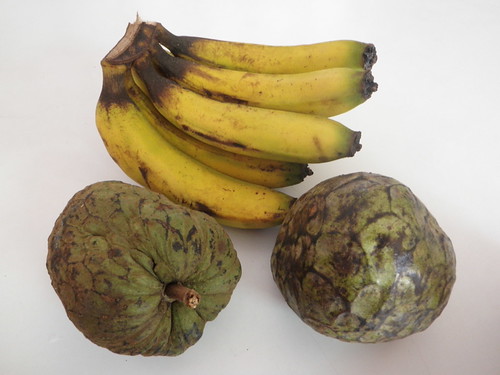
The other fruit was called loquat (níspero in Spanish). The best I could describe one is "a fig that tastes like a half-dried apricot whose hollow center is filled with fat brown seeds". I don't have a picture of them, but these are also tasty. Having the opportunity to try both of them is another one of the small pleasures of having my own place again; I buy a lot more produce these days, and I get it all from the mercado.
Numero dos, I bought my plane ticket home. The date is January 6th, 2011. Unfortunately, this is about two months earlier than I originally intended, but money and research constraints have forced me to change plans. The money aspect is simple: I just don't have enough of it to stay in Guatemala. But even if I stumbled across a pile of gold tomorrow morning, I'd still have to go back to the States early to work on my research for medical school. I had originally planned on getting IRB (institutional review board) approval for said research while I was in Guatemala, then coming back in March with it ready to be churned out. However, I've discovered that getting a proposal accepted while the primary investigator is out of the country is next to impossible. So I have to head back early to make sure the proposal gets approved in time for me to complete my research before 4th year starts back up at the end of April.
On a related note, Caleb is coming to visit on December 20th to spend a couple weeks traveling around Guatemala with me. After that we both head back to the States together. So this means I have roughly one more month of class and clinic. Suddenly it feels like I have very little time left here, but with a ton of things left to do.
Numero uno, I tried some new fruits! (see? Very exciting week.) One was a custard apple (anona in Spanish). I think it looks like a dragon egg. Inside, as the name suggests, are a couple dozen fat shiny black seeds surrounded by creamy, custardy sections of fruit. You eat an anona by picking out a seed encased in fruit, sucking off the pulp and spitting out the seed. They're really delicious.

The other fruit was called loquat (níspero in Spanish). The best I could describe one is "a fig that tastes like a half-dried apricot whose hollow center is filled with fat brown seeds". I don't have a picture of them, but these are also tasty. Having the opportunity to try both of them is another one of the small pleasures of having my own place again; I buy a lot more produce these days, and I get it all from the mercado.
Numero dos, I bought my plane ticket home. The date is January 6th, 2011. Unfortunately, this is about two months earlier than I originally intended, but money and research constraints have forced me to change plans. The money aspect is simple: I just don't have enough of it to stay in Guatemala. But even if I stumbled across a pile of gold tomorrow morning, I'd still have to go back to the States early to work on my research for medical school. I had originally planned on getting IRB (institutional review board) approval for said research while I was in Guatemala, then coming back in March with it ready to be churned out. However, I've discovered that getting a proposal accepted while the primary investigator is out of the country is next to impossible. So I have to head back early to make sure the proposal gets approved in time for me to complete my research before 4th year starts back up at the end of April.
On a related note, Caleb is coming to visit on December 20th to spend a couple weeks traveling around Guatemala with me. After that we both head back to the States together. So this means I have roughly one more month of class and clinic. Suddenly it feels like I have very little time left here, but with a ton of things left to do.
Wednesday, November 10, 2010
Weeks 14 & 15, and oh heck why not 16 too
To give you a summary of these last few weeks, which positively flew by, first we had a Timmy Brigade at Pop Wuj, which I mentioned in the previous post. We spent all week in clinic with them, and helped a lot of people. Then two Saturdays ago four of us climbed a volcano to watch the sunrise from the top. Then I went on a week of vacation with friends up to Todos Santos and Lago de Atitlan, and saw a ton of Guatemala and got in some much-needed down time. I returned home this Monday and started classes and clinic again, and then, just to keep things interesting, moved into an apartment on Wednesday. Now for the details:
Not much more happened with the (Tim-Tim)Timmy Foundation besides what I wrote about in the last post. We had three mobile clinics and two "supersized" clinics at Pop Wuj in total. Each day we saw between 40 and 70 patients in a six hour shift (that's with 3-4 patient rooms). During the mobile clinics we had just about zero lab tests available to us, except for a glucometer, urine dipsticks, and a microscope. But the good (?) thing was, most people presented with the same three complaints, regardless of age: belly pain, headache, and muscle aches, all of which we had some medications for. So most adults got some kind of anti-inflammatory pill and counseling on the importance of staying hydrated, most children got an anti-helminth medication called albendazole and counseling on the importance of staying hydrated, and almost everyone got some kind of pill for gastritis, be it Tums, omeprazole, or ranitidine. And because vitamin deficiency (specifically iron, zinc, vitamin A and magnesium) is extremely common in rural Guatemala, every last patient got vitamins, in prenatal, infant, child, or adult form. We talked a lot about drinking liquids because many patients didn't drink more than a glass or two a day, which very likely was giving them headaches from dehyrdation.
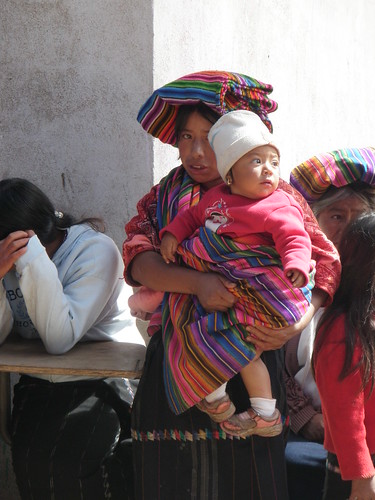
On Friday night after the Timmy Brigade week I climbed Santa Maria with Alex, Deb, and my teacher Ulises. We met at 11:30pm on Friday night in front of the school, then took a 30 minute taxi to the base of the volcano. We started climbing at 12:30. There was a spider web of paths low on the volcano, so we spent the first hour or so weaving through hilly corn fields, high grass, and patches of forest. Ulises, our guide for the trip, did an amazing job navigating this area; I've heard that formally guided tours often get lost a couple times trying to find the one path that leads to the top. But we had no troubles, and soon found ourselves on a steep switchback that led into a forest, then into a cloud forest, and then into just clouds. Three hours later we were nearing the top, and it was spitting rain and getting windier with each step. Soon after we started seeing flashes of dark blue, starry sky appear above us, only to disappear a few seconds behind some clouds that were /really/ whipping by.
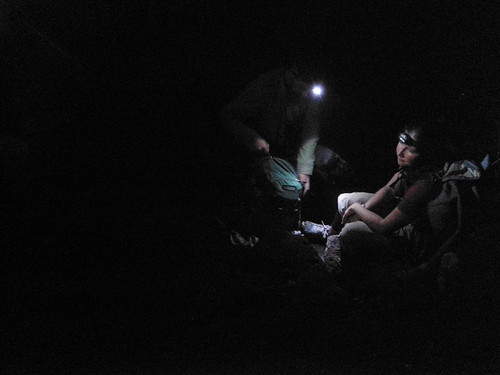
We made it to the top at 4:30am, which was just a bit too early to start watching the sun rise immediately. This was unfortunate, because we all started freezing the moment we got up there. It was soo cold and windy. Luckily there was a leeward side to the summit with a little half circle depression protected by some large rocks. It was clearly also the place where everyone else took shelter up there, judging by the fire pit and the scattered trash. So there we huddled, under Ulises' grandma's blanket, shivering and passing around a brick of dark chocolate (thanks Caleb) and a bottle of Old Friend, a terrible, terrible whiskey that you can buy here. At times Alex and Deb, who were on the ends of the tiny blanket, got too cold, so they would hop up and do this hilarious running-man/penguin-dance to get feeling back in their extremities. As for myself, between the blanket, the whiskey, the chocolate, and the belly laughs from watching those two dance around, I was okay for the 45 minutes or so that we had to wait for the sun to rise. But as soon as the sky began turning colors we all felt obligated to leave the protection of our rocky cubby hole and start snapping photos, and that's when we all /really/ froze. I think my fingers froze, thawed, and refroze at least three times, which didn't tickle. But I got some decent shots, I think:
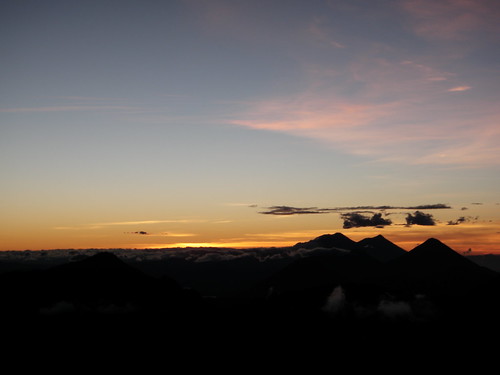
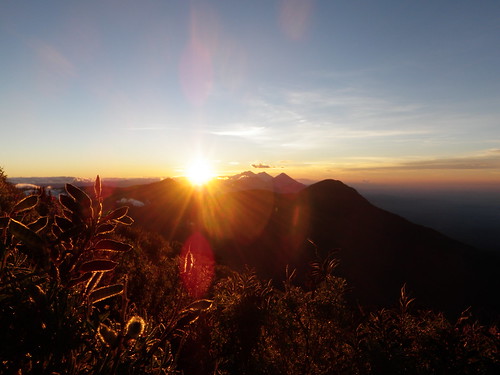
As soon as the sun got above the horizon the temperature became tolerable, so we stayed up there for another hour enjoying the view. This is a picture of Santiaguito, an active volcano which frequently spews ash and vapor:
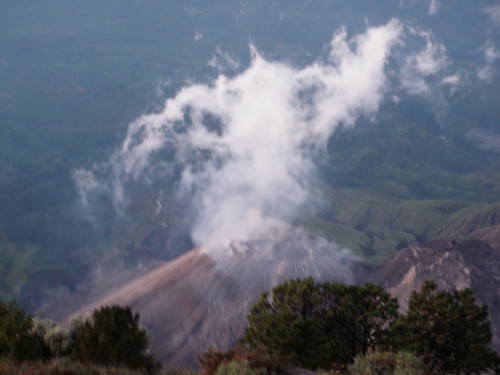
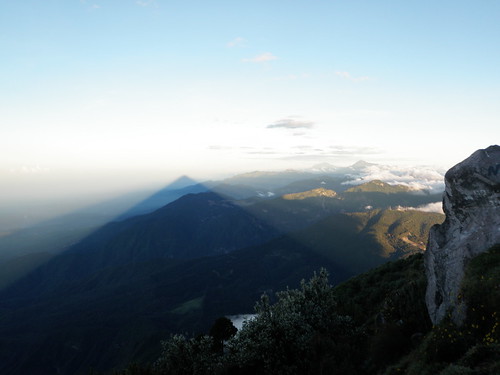
When I first saw this shape on my camera screen I thought I had somehow broken my camera. But then I realized that it was the shadow of the mountain, a near-perfect triangle. How cool is that?
We headed back down the mountain without issue, and were able to collapse in our beds around 10:30. It was definitely worth the effort.
On Sunday Alex, Megan, Kristin and I headed up to Todos Santos Cuchumatán. What a strange few days we spent there! But first, the trip there: epic. Why? 1. road signs don't really exist in Guatemala; 2. to get there, we drove a 1979 VW bus with old brakes and an even older engine, which would spell trouble if we encountered steep hills; 3. to get to Todos Santos, there were only steep hills. So because of 1-3, these things happened:
-We got lost several times trying to get through a city because there weren't any road signs, only a maze of windy cobblestone roads, more often than not blocked by a Sunday market.
-A few of us had to hop out and walk so the bus could make it up a really steep road,
-Several times the brakes started going out while descending a long, steep hill, so we had to pull over and let the brakes cool for an hour or so.

Regardless, we arrived in Todos Santos without too many problems on Sunday, and wandered the city's two main streets, marveling at how everyone, men and women, were wearing traditional dress.
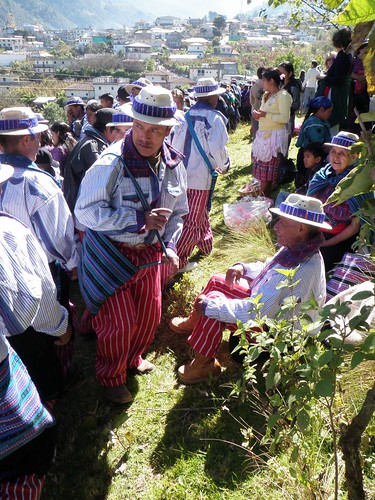
We slept in the van in a "parking lot" that was really someone's farmyard. The next day was All Saint's Day, i.e., Todos Santos. From what I've gathered about Todos Santos in Todos Santos, many of the men in the village spend most of the year on the coast working in coffee, sugar cane, and cotton fincas, but return for the festival, where they spend the money they've earned over the year by renting horses, buying a new "traje", and buying booze. Then they spend the next several days drinking heavily in preparation for the "Skach Koyl", the drunken horse race on All Saint's Day. The race starts at 8am in the morning, with the riders charging up and down a 100-meter track in waves, and taking shots of Quetzalteca in between. The race usually goes until 4pm, and the last man still able to ride wins the respect of the town, which is a fairly big deal for the riders.
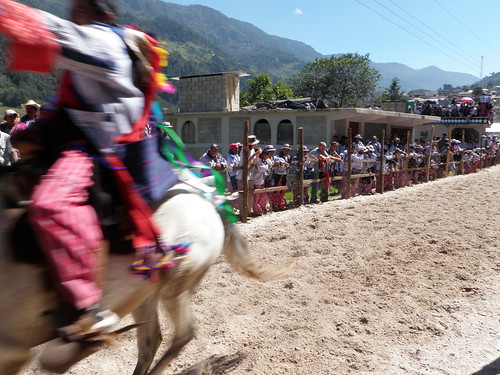
We watched the race in the morning, and the riders were already nearly falling-down drunk. But amazingly, they still galloped hands-free, singing songs and whooping; I would have been hanging on to the horse's mane for dear life. This video does a decent job of showing the race and the mass of spectators that watch it all day.
The next day the town went to the cemetery placing candles, food, water in front of the graves, putting a new coat of paint on the tombs, decorating the crosses with plastic stringers, and praying and singing with their family. Seeing the celebrations at the cemetery gave some meaning to the drunkenness we had seen the previous two days: primarily, the festival honors the dead celebrates everyone who has made it another year, which is an accomplishment while living such a hard life. Regardless, all too often we encountered this:
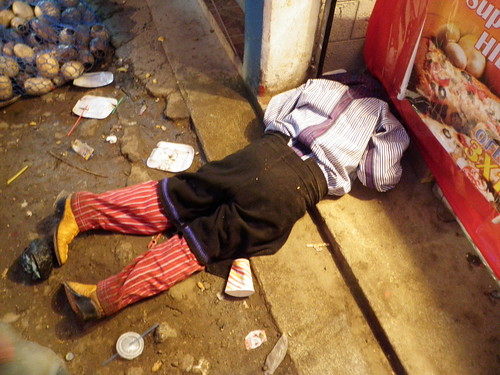
and wandering around in a town where all of the men were falling-over drunk had us all on edge, so we left a day early to head to Lago de Atitlan, where we knew it would be much more tranquilo.
A couple more pictures. 14-17 are also from Todos Santos. This site also has good pictures of the typical dress and the horse races.
We drove to Lago de Atitlan afterward, stopping to let the brakes cool a few times, and once we arrived we spent several days reading, kayaking the lake, enjoying the spectacular view, eating good food, and generally taking it easy.
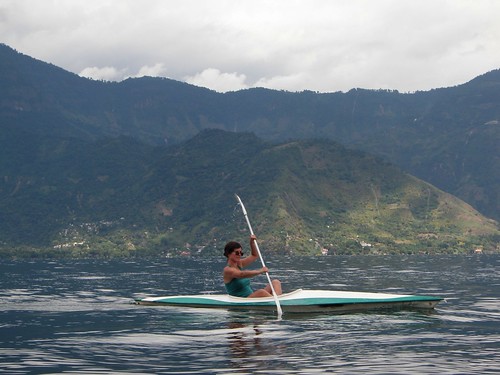
My favorite place by far of all the places we stayed was Casa del Mundo, the house in this picture:
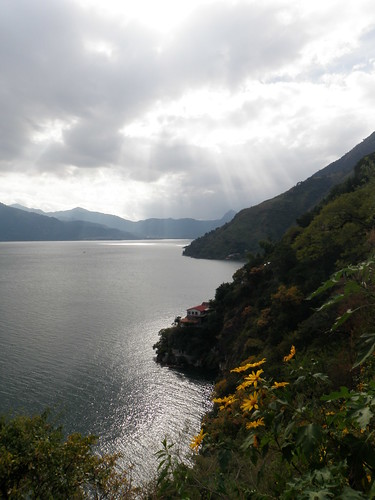
The views from this place were stunning.
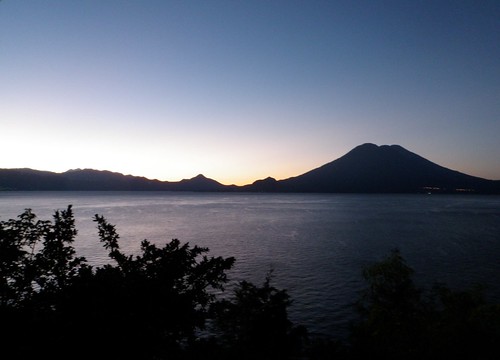
The lake is several meters above normal, so the lowest two patios were underwater, It made for pleasant feet-in-water reading, but at other parts of the lake, many houses, beaches, restaurants, and farmland had been submerged.
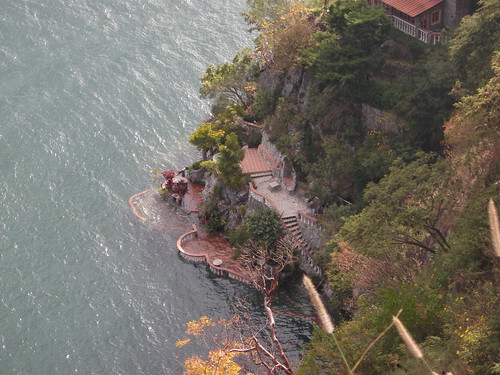
I came home on Monday afternoon, and was happy to start up classes and clinic again. I have about six more weeks to go before Caleb arrives; lots of time to keep working on subjunctive and become more comfortable talking with patients.
As for the apartment, the reasons were many, but the primary was, again, bed bugs. I got new bites the day after my host mom changed my sheets, which makes me think they were riding along in those (bed bugs can survive a wash in the laundry; it is the heat of the dryer that kills them. Most laundry here is line-dried.). Other reasons for moving included: missing cooking, missing vegetables, wanting to have a more flexible meal schedule, and wanting to stretch my little wings o' independence again. Sharing three months with various Quetzaltenango families seems like enough, and after two nights in my little apartment, it feels like the right decision.
Not much more happened with the (Tim-Tim)Timmy Foundation besides what I wrote about in the last post. We had three mobile clinics and two "supersized" clinics at Pop Wuj in total. Each day we saw between 40 and 70 patients in a six hour shift (that's with 3-4 patient rooms). During the mobile clinics we had just about zero lab tests available to us, except for a glucometer, urine dipsticks, and a microscope. But the good (?) thing was, most people presented with the same three complaints, regardless of age: belly pain, headache, and muscle aches, all of which we had some medications for. So most adults got some kind of anti-inflammatory pill and counseling on the importance of staying hydrated, most children got an anti-helminth medication called albendazole and counseling on the importance of staying hydrated, and almost everyone got some kind of pill for gastritis, be it Tums, omeprazole, or ranitidine. And because vitamin deficiency (specifically iron, zinc, vitamin A and magnesium) is extremely common in rural Guatemala, every last patient got vitamins, in prenatal, infant, child, or adult form. We talked a lot about drinking liquids because many patients didn't drink more than a glass or two a day, which very likely was giving them headaches from dehyrdation.

On Friday night after the Timmy Brigade week I climbed Santa Maria with Alex, Deb, and my teacher Ulises. We met at 11:30pm on Friday night in front of the school, then took a 30 minute taxi to the base of the volcano. We started climbing at 12:30. There was a spider web of paths low on the volcano, so we spent the first hour or so weaving through hilly corn fields, high grass, and patches of forest. Ulises, our guide for the trip, did an amazing job navigating this area; I've heard that formally guided tours often get lost a couple times trying to find the one path that leads to the top. But we had no troubles, and soon found ourselves on a steep switchback that led into a forest, then into a cloud forest, and then into just clouds. Three hours later we were nearing the top, and it was spitting rain and getting windier with each step. Soon after we started seeing flashes of dark blue, starry sky appear above us, only to disappear a few seconds behind some clouds that were /really/ whipping by.

We made it to the top at 4:30am, which was just a bit too early to start watching the sun rise immediately. This was unfortunate, because we all started freezing the moment we got up there. It was soo cold and windy. Luckily there was a leeward side to the summit with a little half circle depression protected by some large rocks. It was clearly also the place where everyone else took shelter up there, judging by the fire pit and the scattered trash. So there we huddled, under Ulises' grandma's blanket, shivering and passing around a brick of dark chocolate (thanks Caleb) and a bottle of Old Friend, a terrible, terrible whiskey that you can buy here. At times Alex and Deb, who were on the ends of the tiny blanket, got too cold, so they would hop up and do this hilarious running-man/penguin-dance to get feeling back in their extremities. As for myself, between the blanket, the whiskey, the chocolate, and the belly laughs from watching those two dance around, I was okay for the 45 minutes or so that we had to wait for the sun to rise. But as soon as the sky began turning colors we all felt obligated to leave the protection of our rocky cubby hole and start snapping photos, and that's when we all /really/ froze. I think my fingers froze, thawed, and refroze at least three times, which didn't tickle. But I got some decent shots, I think:


As soon as the sun got above the horizon the temperature became tolerable, so we stayed up there for another hour enjoying the view. This is a picture of Santiaguito, an active volcano which frequently spews ash and vapor:


When I first saw this shape on my camera screen I thought I had somehow broken my camera. But then I realized that it was the shadow of the mountain, a near-perfect triangle. How cool is that?
We headed back down the mountain without issue, and were able to collapse in our beds around 10:30. It was definitely worth the effort.
On Sunday Alex, Megan, Kristin and I headed up to Todos Santos Cuchumatán. What a strange few days we spent there! But first, the trip there: epic. Why? 1. road signs don't really exist in Guatemala; 2. to get there, we drove a 1979 VW bus with old brakes and an even older engine, which would spell trouble if we encountered steep hills; 3. to get to Todos Santos, there were only steep hills. So because of 1-3, these things happened:
-We got lost several times trying to get through a city because there weren't any road signs, only a maze of windy cobblestone roads, more often than not blocked by a Sunday market.
-A few of us had to hop out and walk so the bus could make it up a really steep road,
-Several times the brakes started going out while descending a long, steep hill, so we had to pull over and let the brakes cool for an hour or so.

Regardless, we arrived in Todos Santos without too many problems on Sunday, and wandered the city's two main streets, marveling at how everyone, men and women, were wearing traditional dress.

We slept in the van in a "parking lot" that was really someone's farmyard. The next day was All Saint's Day, i.e., Todos Santos. From what I've gathered about Todos Santos in Todos Santos, many of the men in the village spend most of the year on the coast working in coffee, sugar cane, and cotton fincas, but return for the festival, where they spend the money they've earned over the year by renting horses, buying a new "traje", and buying booze. Then they spend the next several days drinking heavily in preparation for the "Skach Koyl", the drunken horse race on All Saint's Day. The race starts at 8am in the morning, with the riders charging up and down a 100-meter track in waves, and taking shots of Quetzalteca in between. The race usually goes until 4pm, and the last man still able to ride wins the respect of the town, which is a fairly big deal for the riders.

We watched the race in the morning, and the riders were already nearly falling-down drunk. But amazingly, they still galloped hands-free, singing songs and whooping; I would have been hanging on to the horse's mane for dear life. This video does a decent job of showing the race and the mass of spectators that watch it all day.
The next day the town went to the cemetery placing candles, food, water in front of the graves, putting a new coat of paint on the tombs, decorating the crosses with plastic stringers, and praying and singing with their family. Seeing the celebrations at the cemetery gave some meaning to the drunkenness we had seen the previous two days: primarily, the festival honors the dead celebrates everyone who has made it another year, which is an accomplishment while living such a hard life. Regardless, all too often we encountered this:

and wandering around in a town where all of the men were falling-over drunk had us all on edge, so we left a day early to head to Lago de Atitlan, where we knew it would be much more tranquilo.
A couple more pictures. 14-17 are also from Todos Santos. This site also has good pictures of the typical dress and the horse races.
We drove to Lago de Atitlan afterward, stopping to let the brakes cool a few times, and once we arrived we spent several days reading, kayaking the lake, enjoying the spectacular view, eating good food, and generally taking it easy.

My favorite place by far of all the places we stayed was Casa del Mundo, the house in this picture:

The views from this place were stunning.

The lake is several meters above normal, so the lowest two patios were underwater, It made for pleasant feet-in-water reading, but at other parts of the lake, many houses, beaches, restaurants, and farmland had been submerged.

I came home on Monday afternoon, and was happy to start up classes and clinic again. I have about six more weeks to go before Caleb arrives; lots of time to keep working on subjunctive and become more comfortable talking with patients.
As for the apartment, the reasons were many, but the primary was, again, bed bugs. I got new bites the day after my host mom changed my sheets, which makes me think they were riding along in those (bed bugs can survive a wash in the laundry; it is the heat of the dryer that kills them. Most laundry here is line-dried.). Other reasons for moving included: missing cooking, missing vegetables, wanting to have a more flexible meal schedule, and wanting to stretch my little wings o' independence again. Sharing three months with various Quetzaltenango families seems like enough, and after two nights in my little apartment, it feels like the right decision.
Saturday, October 23, 2010
Week 13: Medicina!
I did my first mobile clinic last week, and it was /great/. Essentially, mobile clinic = packing our school's doctors, dentist, nurse, students, and medical supplies into a minivan and driving between 30 and 90 minutes to a rural village and seeing a bunch of patients. Interestingly, last week we went to the same village - the same community leader's house, in fact - that hosted the elote festival from over a month ago.
The clinic was bare bones but great. We had two rooms, both with dirt floors, one for the dentist and one for the doctors. Giving the dentist his own room made sense, since all he was doing was pulling teeth that morning. The docs' room had a plastic roof, a plastic table and two stools on one end, and an old barber's chair at the other. Deb, a pediatrician, and I sat at the table and saw niños, while Dr. Christian, a Guatemalteco, saw the adultos. We saw somewhere around 15 kids in the half day, and almost all of them had 1. stomach pain and 2. a headache (from dehydration). So almost all of the kids 1. got albendazole, an antihelmintic (read: dewormer) and 2. education on the importance of drinking at least /1/ glass of liquid per day. All the kiddos also got 3. children's vitamins, since almost all of them are small for their age, probably due to malnutrition. And, unfortunately, after they visited the doctors, most of them visited the dentist too to lose a couple of teeth.
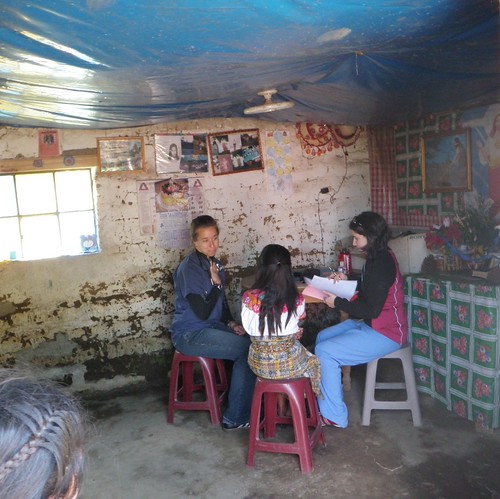
The Pop Wuj medical program continues to be incredibly crazy - sometimes it feels like being on IM again - but I'm learning, darn it: I'm starting to remember the right questions and commands for interviewing and examining patients, and I'm understanding more of what the patients are saying, which is only of slight importance, no? I'm still taking classes in the afternoon after clinic. Right now I'm working on learning the tenses of subjunctive (very, very roughly equivalent to "If I were you"). Oy. I may get my first concussion from subjunctive, and it will be because I had been banging my head on my desk.
I'm still enjoying Guatemala. I baked brownies for the Thursday dinner. They were tasty, largely because of the US peanut butter and Ghirardelli chocolate chips that Mr. Matt Percy brought down for me. Surprisingly, Guatemalan PB is no good; it is expensive and/or loaded with palm oil. Not good for eating, and even less so for baking.
I haven't gotten new bed bug bites in a while, but I remain suspicious. The problem with this attitude is the hyper-vigilance; you discover a lot of false positives. For example, just a few mornings ago I nearly flipped a lid when I discovered a line of three red dots on my butt. Luckily, on closer inspection they turned out to be just zits. Attractive, right? (sorry Caleb) But way better than bed bug bites. But if it's not pimples, there's the dry skin, the mosquito bites, the razor burn, the random flea attacks, etc. Needless to say, I'm itchy almost all of the time, and "not being itchy" is one of the things I'm definitely looking forward to when I get back to the States.
This week has been crazy; folks from the Timmy Foundation are here on a "Timmy brigade", so we've been doing mobile clinic almost every day. It has been exhausting, so next week I'm taking the week off to go to Todos Santos Cuchumatán for the Day of the Dead and All Saint's Day celebrations, and afterward heading over to Lago de Atitlan for some by-the-waterside studying. And in two nights a group of us are going to attempt a night summit of Santa Maria, a beautiful cone volcano near Xela (12,375 feet). I'll be sure to take pictures and tell the stories :)
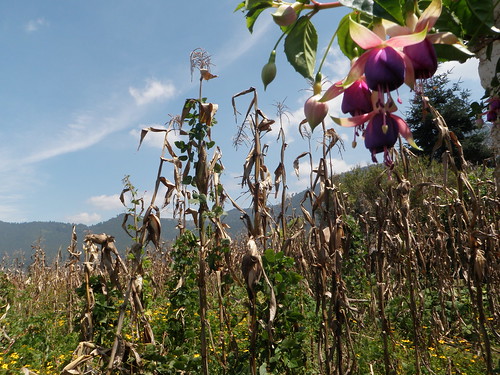
The clinic was bare bones but great. We had two rooms, both with dirt floors, one for the dentist and one for the doctors. Giving the dentist his own room made sense, since all he was doing was pulling teeth that morning. The docs' room had a plastic roof, a plastic table and two stools on one end, and an old barber's chair at the other. Deb, a pediatrician, and I sat at the table and saw niños, while Dr. Christian, a Guatemalteco, saw the adultos. We saw somewhere around 15 kids in the half day, and almost all of them had 1. stomach pain and 2. a headache (from dehydration). So almost all of the kids 1. got albendazole, an antihelmintic (read: dewormer) and 2. education on the importance of drinking at least /1/ glass of liquid per day. All the kiddos also got 3. children's vitamins, since almost all of them are small for their age, probably due to malnutrition. And, unfortunately, after they visited the doctors, most of them visited the dentist too to lose a couple of teeth.

The Pop Wuj medical program continues to be incredibly crazy - sometimes it feels like being on IM again - but I'm learning, darn it: I'm starting to remember the right questions and commands for interviewing and examining patients, and I'm understanding more of what the patients are saying, which is only of slight importance, no? I'm still taking classes in the afternoon after clinic. Right now I'm working on learning the tenses of subjunctive (very, very roughly equivalent to "If I were you"). Oy. I may get my first concussion from subjunctive, and it will be because I had been banging my head on my desk.
I'm still enjoying Guatemala. I baked brownies for the Thursday dinner. They were tasty, largely because of the US peanut butter and Ghirardelli chocolate chips that Mr. Matt Percy brought down for me. Surprisingly, Guatemalan PB is no good; it is expensive and/or loaded with palm oil. Not good for eating, and even less so for baking.
I haven't gotten new bed bug bites in a while, but I remain suspicious. The problem with this attitude is the hyper-vigilance; you discover a lot of false positives. For example, just a few mornings ago I nearly flipped a lid when I discovered a line of three red dots on my butt. Luckily, on closer inspection they turned out to be just zits. Attractive, right? (sorry Caleb) But way better than bed bug bites. But if it's not pimples, there's the dry skin, the mosquito bites, the razor burn, the random flea attacks, etc. Needless to say, I'm itchy almost all of the time, and "not being itchy" is one of the things I'm definitely looking forward to when I get back to the States.
This week has been crazy; folks from the Timmy Foundation are here on a "Timmy brigade", so we've been doing mobile clinic almost every day. It has been exhausting, so next week I'm taking the week off to go to Todos Santos Cuchumatán for the Day of the Dead and All Saint's Day celebrations, and afterward heading over to Lago de Atitlan for some by-the-waterside studying. And in two nights a group of us are going to attempt a night summit of Santa Maria, a beautiful cone volcano near Xela (12,375 feet). I'll be sure to take pictures and tell the stories :)

Tuesday, October 19, 2010
Week 12: Tres Meses
Alright! Three months in Guatemala. Seems like a good time to look back and see how far I've come. I now know 18 tenses of Spanish, up from 12 about a month ago. That said, I probably only use eight regularly, and probably only four with any real skill. And "skill" is highly debatable. But I'm definitely conversational at this point, and am chatting more and more about "harder" topics. For example, yesterday my teacher and I debated the origins of homosexuality, and followed that up with a chat about why concrete blocks seem to be the #1 building material in Guatemala (readily available ingredients and a powerful monopoly with a strong influence in the government).
The medical program is paying off, although the first week or so was tough - I was usually over in triage, where I'd take a vital signs (blood pressure, pulse, temperature, blood sugar [if the patient was diabetic], height, and weight), as well as get a chief complaint. The problem was, and still very much is, that I speak hardly any "medical" Spanish, so giving instructions was, um, difficult. My shining example was the first time I had to ask someone to take off their shoes and stand with their back against the wall so I could measure their height. When it came time to ask, I realized I had none of the right words at my disposal. How do you say, "Stand over here"? I knew "shoes", but how do tell someone to take them off? And I knew the word for "back" but how do you tell someone to put it against the wall? And for that matter, what was the word for "wall"?! So I ended up saying something like, "Please come here on your feet. Stop your shoes. Er, come without shoes. And your back against the cement blocks. Now make yourself very tall. Thank you." The rest of the vital signs went about the same: "Now I will take your weight. On your feet without shoes come to the white heavy machine." It was horrid, hilarious Spanish, and immediately afterward I went and rifled through my medical Spanish book for the right commands. I'm getting better with each clinic, but I still have a long ways to go.
In terms of events from last week, it was pretty "normal": clinic in the mornings on Tuesday, Wednesday, and Friday, classes in the afternoons, Thursday dinner in the school (ratatouille, fava bean pasta and strawbery shortcake [yum!]), and "cultural competency" lectures, running, chores, and homework filling the gaps. I spent all of last weekend studying and working on my MSA (which is unfortunately more tenacious than bed bugs). I'll probably do the same this weekend.
The new house is still good, although the little one gave me a bad cold (probably while he was snotting/climbing all over me while I was doing homework this weekend). The food is great - plenty of comida tipica. I don't have pictures, but here's what I ate yesterday, for example:
Breakfast:
Toast with peanut butter and pineapple jam
Corn Flakes with a banana
Papaya slices
Nescafe
Lunch:
Carne asada with chirmol
White rice
Tamalito de chipilin
Dollop of black beans
Nescafe
Dinner:
Fried plaintains
Refried black beans
Dollop of "crema pura" (like sour cream, but a bit lighter in flavor)
Corn tortillas
Nescafe
In general, food in the cities is very carb-heavy. My family is pretty good about getting in fruits and vegetables, but some of my friends here used to joke about how they were served the "Big 5" at almost every meal - corn, bread, pasta, rice and potatoes. (This is probably one of the reasons why diabetes is more common in the cities than in the villages). But I've been liking the food - it is simple but filling. And my host moms have been teaching me how to cook :)
Also notice the Nescafe. Every family I've stayed with drinks it with every meal, usually with enough sugar to make it sweeter than pop. No me gusta. Luckily it is usually prepared to be about as strong as weak tea, otherwise I'd probably have heart palpitations from how many cups I drink a day (it gets cold in the afternoons!). It is on my To Do list to find a local co-op that grows, harvests, and roasts their own beans, buy a pound from them, and grind a bit each week so I can have enjoy tasty coffee once again. Soon, I will find them.
I'll leave you with a picture of Doña Marie working on a faja. I only have a couple pictures from last week. Next week I'll post a bunch more, though :)
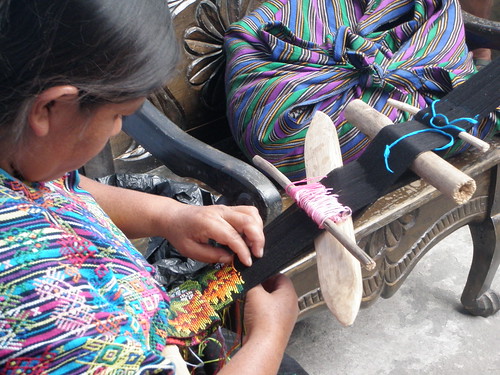
The medical program is paying off, although the first week or so was tough - I was usually over in triage, where I'd take a vital signs (blood pressure, pulse, temperature, blood sugar [if the patient was diabetic], height, and weight), as well as get a chief complaint. The problem was, and still very much is, that I speak hardly any "medical" Spanish, so giving instructions was, um, difficult. My shining example was the first time I had to ask someone to take off their shoes and stand with their back against the wall so I could measure their height. When it came time to ask, I realized I had none of the right words at my disposal. How do you say, "Stand over here"? I knew "shoes", but how do tell someone to take them off? And I knew the word for "back" but how do you tell someone to put it against the wall? And for that matter, what was the word for "wall"?! So I ended up saying something like, "Please come here on your feet. Stop your shoes. Er, come without shoes. And your back against the cement blocks. Now make yourself very tall. Thank you." The rest of the vital signs went about the same: "Now I will take your weight. On your feet without shoes come to the white heavy machine." It was horrid, hilarious Spanish, and immediately afterward I went and rifled through my medical Spanish book for the right commands. I'm getting better with each clinic, but I still have a long ways to go.
In terms of events from last week, it was pretty "normal": clinic in the mornings on Tuesday, Wednesday, and Friday, classes in the afternoons, Thursday dinner in the school (ratatouille, fava bean pasta and strawbery shortcake [yum!]), and "cultural competency" lectures, running, chores, and homework filling the gaps. I spent all of last weekend studying and working on my MSA (which is unfortunately more tenacious than bed bugs). I'll probably do the same this weekend.
The new house is still good, although the little one gave me a bad cold (probably while he was snotting/climbing all over me while I was doing homework this weekend). The food is great - plenty of comida tipica. I don't have pictures, but here's what I ate yesterday, for example:
Breakfast:
Toast with peanut butter and pineapple jam
Corn Flakes with a banana
Papaya slices
Nescafe
Lunch:
Carne asada with chirmol
White rice
Tamalito de chipilin
Dollop of black beans
Nescafe
Dinner:
Fried plaintains
Refried black beans
Dollop of "crema pura" (like sour cream, but a bit lighter in flavor)
Corn tortillas
Nescafe
In general, food in the cities is very carb-heavy. My family is pretty good about getting in fruits and vegetables, but some of my friends here used to joke about how they were served the "Big 5" at almost every meal - corn, bread, pasta, rice and potatoes. (This is probably one of the reasons why diabetes is more common in the cities than in the villages). But I've been liking the food - it is simple but filling. And my host moms have been teaching me how to cook :)
Also notice the Nescafe. Every family I've stayed with drinks it with every meal, usually with enough sugar to make it sweeter than pop. No me gusta. Luckily it is usually prepared to be about as strong as weak tea, otherwise I'd probably have heart palpitations from how many cups I drink a day (it gets cold in the afternoons!). It is on my To Do list to find a local co-op that grows, harvests, and roasts their own beans, buy a pound from them, and grind a bit each week so I can have enjoy tasty coffee once again. Soon, I will find them.
I'll leave you with a picture of Doña Marie working on a faja. I only have a couple pictures from last week. Next week I'll post a bunch more, though :)

Wednesday, October 6, 2010
Week 11: Afuera de la Sartén...
...y en el fuego.
Another busy week, although partly not in the way I wanted it to be. To be brief, the house I moved into also had bed bugs. Since my tolerance for putting up with the critters has dropped to just about zero, when I got bites a few days ago I immediately started the process of moving again: sending all of my clothes to the laundromat to be washed and super-dried and inspecting/spraying/quarantining the rest of my stuff. I moved to a new house two days ago, but the family situation is similar: mom owns the house, her daughter lives there too with her two kids, Sebastian and Emilio, aged 12 and 6, respectively. They're all nice, the food is good, and the home is close to school. I'm hoping this family is different in that their house is blood-sucking insect free. My fingers are crossed.
I also started the medical program last week, which has contributed to the craziness of last week, but in a good way, methinks. The schedule for the medical program is pretty jam-packed: I have Spanish class from 2-6 every afternoon, three days a week we have clinic from 8-1, and the two mornings "off" are occupied by cultural competency lectures. I've been learning a lot of off-the-cuff Spanish, but I find myself wishing I had an afternoon to sit down and memorize a few dozen words for body parts or illnesses. Regardless, it has been a pleasure working in the clinic, and I'm looking forward to contributing more as my Spanish improves. It has also been nice to be exercising my medical knowledge again; I had definitely noticed that it was slipping away while I was busying myself with crash-course Spanish.
In other news, last week a group of teachers and students went to Salcaja, where, according to our teachers, their two primary exports are 1. dyed cloth and 2. bootlegged liquor. So we went to experience both, and apparently the teachers knew of a residence that actually manufactured both: not only did they weave corte cloth but they also brewed "caldo de frutas". Cortes are the skirts worn by indigenous women of Guatemala. The hem length, stitching, and patterns of these skirts vary between each village; some look almost like Jackson Pollock designed them, others are simple dark blue with the occasional stripe, others red with hand-woven floral patterns. (Click around in the link I included; it does a good job of explaining "traditional" clothing in Guatemala.) Caldo de frutas is basically 90 proof booze steeped in a ton of fruit. So while we were in their house we watched the husband weave corte fabric, then went downstairs where his wife had put out a plate of the fruit they had used to make the liquor. Both the liquor and the fruits were surprisingly tasty :)
Outside of the moving, the clinics, and the classes, I chance to go on a hike this weekend up Jesus mountain, a big hill just on the edge of Xela. It is called this because there is a church on the top of it that says "Cristo Viene" in large, Hollywood-esque letters across the roof. It was a good hike, and back behind the church is a lot of highland farmland. We encountered a bunch of folk harvesting green onions back there, as well as this guy:
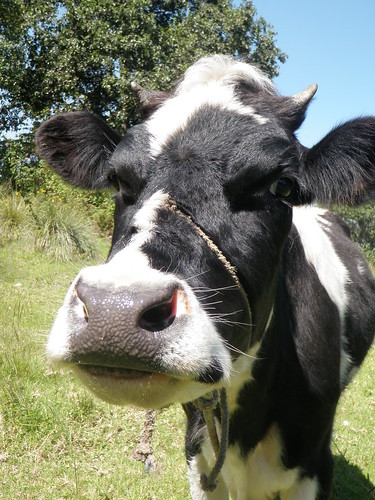
Mú. :)
Whew. I'm hoping next week is more tranquilo. Thanks for reading, folks!
Another busy week, although partly not in the way I wanted it to be. To be brief, the house I moved into also had bed bugs. Since my tolerance for putting up with the critters has dropped to just about zero, when I got bites a few days ago I immediately started the process of moving again: sending all of my clothes to the laundromat to be washed and super-dried and inspecting/spraying/quarantining the rest of my stuff. I moved to a new house two days ago, but the family situation is similar: mom owns the house, her daughter lives there too with her two kids, Sebastian and Emilio, aged 12 and 6, respectively. They're all nice, the food is good, and the home is close to school. I'm hoping this family is different in that their house is blood-sucking insect free. My fingers are crossed.
I also started the medical program last week, which has contributed to the craziness of last week, but in a good way, methinks. The schedule for the medical program is pretty jam-packed: I have Spanish class from 2-6 every afternoon, three days a week we have clinic from 8-1, and the two mornings "off" are occupied by cultural competency lectures. I've been learning a lot of off-the-cuff Spanish, but I find myself wishing I had an afternoon to sit down and memorize a few dozen words for body parts or illnesses. Regardless, it has been a pleasure working in the clinic, and I'm looking forward to contributing more as my Spanish improves. It has also been nice to be exercising my medical knowledge again; I had definitely noticed that it was slipping away while I was busying myself with crash-course Spanish.
In other news, last week a group of teachers and students went to Salcaja, where, according to our teachers, their two primary exports are 1. dyed cloth and 2. bootlegged liquor. So we went to experience both, and apparently the teachers knew of a residence that actually manufactured both: not only did they weave corte cloth but they also brewed "caldo de frutas". Cortes are the skirts worn by indigenous women of Guatemala. The hem length, stitching, and patterns of these skirts vary between each village; some look almost like Jackson Pollock designed them, others are simple dark blue with the occasional stripe, others red with hand-woven floral patterns. (Click around in the link I included; it does a good job of explaining "traditional" clothing in Guatemala.) Caldo de frutas is basically 90 proof booze steeped in a ton of fruit. So while we were in their house we watched the husband weave corte fabric, then went downstairs where his wife had put out a plate of the fruit they had used to make the liquor. Both the liquor and the fruits were surprisingly tasty :)
Outside of the moving, the clinics, and the classes, I chance to go on a hike this weekend up Jesus mountain, a big hill just on the edge of Xela. It is called this because there is a church on the top of it that says "Cristo Viene" in large, Hollywood-esque letters across the roof. It was a good hike, and back behind the church is a lot of highland farmland. We encountered a bunch of folk harvesting green onions back there, as well as this guy:

Mú. :)
Whew. I'm hoping next week is more tranquilo. Thanks for reading, folks!
Sunday, October 3, 2010
Week 10: Changes, Shadyness
Last week I came back to Guatemala to find it, incredibly, even more soggy than usual: tropical storm/depression Matthew had been sitting over the country for four days, and everything was soaked through and through. Miraculously, the hillsides had held up and there weren't any mudslides blocking the road to Xela. However, when I arrived home I found my room hadn't fared as well: one entire wall had turned fuzzy with green, white and brown mold. Upon further examination, the mold had already spread to another wall, two pairs of my shoes, the headboard of my bed, and one of my running shirts that had been hanging on a nail. Woah, right?
Initially I accepted this as "just another one of those Guate-things I'm going to have to deal with". But over the next few days I found myself waking up congested; more than what I'd get with a normal cold, which had been spreading around the school. And my nose would clear as soon as I went to school. So I soon convinced myself that living inside a ball of mold was unhealthy (duh, right?), and started thinking of what to do about it. My options were 1. get rid of the mold or 2. move. Because I was really, really fond of my family I bought some bleach on Saturday and attempted to scrub away the badness, but quickly realized that it was futile: mold had moved in while I was in Canada, and it was set on staying. You'd think that, upon realizing that my only other option was to switch families, that I'd be content with the decision, right? Nope. I was quite unhappy about it, and spent a couple days in denial, moping around and griping to my friends. Then Monday I woke up feeling especially ill and frustrated with life in general, so I fairly spontaneously decided that enough was enough: I was moving.
There were plenty of tears when I told my host mom about my decision, but she was very gracious and understanding. I had my "last supper" with them on Monday night. We had the usual: refried black beans, tortillas, fried plantains, eggs and coffee. We told ghost stories and gossiped, also per usual, and then after more tears and hugs, I left. As soon as I closed the front door behind me I had an incredible feeling of ambivalence: on the one hand I felt like I was leaving behind my family and my home, but on the other hand I was relieved to be walking away from the house which had given me so much grief over the last 2.5 months, what with the mold and bed bugs.
So now I am with a new family, lead by Doña Amanda. It is about the same distance from the school, in a mold- and bed bug-free room, and so far, so good. I'll write more about them in another post.
In other news, Saturday night was dramatastic. Here's the story: a group of us were hanging out at El Cuartito on Saturday night, sharing a bottle of wine and chatting. Behind us were sitting two /very/ drunk young Guatemalans. At one point, one got up and wobbled off. Shortly thereafter we realized that Merete's jacket was gone, which had her fancy Norwegian phone and wallet inside of it. Upon further recollection, Merete recalled that the guy that had been wearing a hooded jacket upside-down, which was probably hers. But the guy was long gone by the time we realized this. Luckily, his friend had hung around the cafe, and so Merete went over and started chatting with him. He started flirting/slurring with her in English, however when Merete eventually asked him about his friend and her jacket, he suddenly lost all ability to speak English and claimed that he had been drinking solo. So we told the waiters about our dilemma. They were really nice guys, and they tried to get information out of the friend, too. They failed, and recommended calling the police, so we did.
I'm not sure if the bartenders were responsible, but about five minutes later, not kidding, the Guatemalan version of Michael Chiklis in "The Shield" shows up: shaved head, wearing a keffiyeh around his neck, leather jacket and jeans, coolly smoking a cigarette. He said he was a "friend" of the police and then took the friend outside to "talk". Ten minutes later Merete goes outside to wait for the police to show up, and notices that the thief's friend face was bleeding from multiple places. Chiklis informs Merete that he "fell on the curb". /Sketch-y/.
Soon afterward eight cops show up in two big pickup trucks and interview the friend, which basically involved shoving him around on the street shouting questions, and when he still didn't say anything, throwing him bodily into the back cab of a police truck. Then they huddled, Chiklis included. A bit later Chiklis comes over to us and asks for Merete's Guatemalan phone. We ask why, and he says, we didn't find anything of Merete's in this friend's clothes, but if you give us Merete's phone, we'll say we found it in his pants and arrest him, keeping him in jail for one week, or until he fesses up about who his friend was. Skeeeeetch. Luckily this grand scheme couldn't have worked because Merete was leaving two days later.
After the cops found out that they couldn't frame anyone that night they lost interest and most drove off (they still took the friend to jail, though). Merete still needed to file a claim for insurance purposes though, so we went to the police station in the back of one of their trucks. The police station had more people with automatic weapons than I've ever seen in my life. Kind of intimidating, but we got the report filed and canceled her cards the next morning.
I've posted some photos of last week's market on my Flickr page. Usually on the first of each month the central park has a bigger-than-usual market, but this month Xela is celebrating their saint, the Virgin Rosario, so the market was /huge/. I went with a couple friends on Sunday. Didn't buy anything other than three slices of pizza (for $1!), but it was enjoyable partaking in the festivities.
Initially I accepted this as "just another one of those Guate-things I'm going to have to deal with". But over the next few days I found myself waking up congested; more than what I'd get with a normal cold, which had been spreading around the school. And my nose would clear as soon as I went to school. So I soon convinced myself that living inside a ball of mold was unhealthy (duh, right?), and started thinking of what to do about it. My options were 1. get rid of the mold or 2. move. Because I was really, really fond of my family I bought some bleach on Saturday and attempted to scrub away the badness, but quickly realized that it was futile: mold had moved in while I was in Canada, and it was set on staying. You'd think that, upon realizing that my only other option was to switch families, that I'd be content with the decision, right? Nope. I was quite unhappy about it, and spent a couple days in denial, moping around and griping to my friends. Then Monday I woke up feeling especially ill and frustrated with life in general, so I fairly spontaneously decided that enough was enough: I was moving.
There were plenty of tears when I told my host mom about my decision, but she was very gracious and understanding. I had my "last supper" with them on Monday night. We had the usual: refried black beans, tortillas, fried plantains, eggs and coffee. We told ghost stories and gossiped, also per usual, and then after more tears and hugs, I left. As soon as I closed the front door behind me I had an incredible feeling of ambivalence: on the one hand I felt like I was leaving behind my family and my home, but on the other hand I was relieved to be walking away from the house which had given me so much grief over the last 2.5 months, what with the mold and bed bugs.
So now I am with a new family, lead by Doña Amanda. It is about the same distance from the school, in a mold- and bed bug-free room, and so far, so good. I'll write more about them in another post.
In other news, Saturday night was dramatastic. Here's the story: a group of us were hanging out at El Cuartito on Saturday night, sharing a bottle of wine and chatting. Behind us were sitting two /very/ drunk young Guatemalans. At one point, one got up and wobbled off. Shortly thereafter we realized that Merete's jacket was gone, which had her fancy Norwegian phone and wallet inside of it. Upon further recollection, Merete recalled that the guy that had been wearing a hooded jacket upside-down, which was probably hers. But the guy was long gone by the time we realized this. Luckily, his friend had hung around the cafe, and so Merete went over and started chatting with him. He started flirting/slurring with her in English, however when Merete eventually asked him about his friend and her jacket, he suddenly lost all ability to speak English and claimed that he had been drinking solo. So we told the waiters about our dilemma. They were really nice guys, and they tried to get information out of the friend, too. They failed, and recommended calling the police, so we did.
I'm not sure if the bartenders were responsible, but about five minutes later, not kidding, the Guatemalan version of Michael Chiklis in "The Shield" shows up: shaved head, wearing a keffiyeh around his neck, leather jacket and jeans, coolly smoking a cigarette. He said he was a "friend" of the police and then took the friend outside to "talk". Ten minutes later Merete goes outside to wait for the police to show up, and notices that the thief's friend face was bleeding from multiple places. Chiklis informs Merete that he "fell on the curb". /Sketch-y/.
Soon afterward eight cops show up in two big pickup trucks and interview the friend, which basically involved shoving him around on the street shouting questions, and when he still didn't say anything, throwing him bodily into the back cab of a police truck. Then they huddled, Chiklis included. A bit later Chiklis comes over to us and asks for Merete's Guatemalan phone. We ask why, and he says, we didn't find anything of Merete's in this friend's clothes, but if you give us Merete's phone, we'll say we found it in his pants and arrest him, keeping him in jail for one week, or until he fesses up about who his friend was. Skeeeeetch. Luckily this grand scheme couldn't have worked because Merete was leaving two days later.
After the cops found out that they couldn't frame anyone that night they lost interest and most drove off (they still took the friend to jail, though). Merete still needed to file a claim for insurance purposes though, so we went to the police station in the back of one of their trucks. The police station had more people with automatic weapons than I've ever seen in my life. Kind of intimidating, but we got the report filed and canceled her cards the next morning.
I've posted some photos of last week's market on my Flickr page. Usually on the first of each month the central park has a bigger-than-usual market, but this month Xela is celebrating their saint, the Virgin Rosario, so the market was /huge/. I went with a couple friends on Sunday. Didn't buy anything other than three slices of pizza (for $1!), but it was enjoyable partaking in the festivities.
Sunday, September 26, 2010
Week 8 & 9: Celebrations
Well these two weeks positively flew by. Independence week in Xela was about as fun and crazy as I expected it to be: more parades than I could shake a stick at and lots of good times with friends. Here's a brief summary:
On Tuesday night most of the city gathered in Parque Central or the Minerva Temple to listen to music and watch a few nighttime parades, but it seems mostly people went to Parque Central to stand around and stare at the groups of gringos who were drunk and/or dancing. My group definitely was an "and".

Wednesday we didn't have classes, but we gathered at the school anyway to BBQ, study, play round-the-world ping pong, and watch movies. Tasty and fun.
Thursday was class and fair. Fair = insane, but really, a lot like any fair anywhere else in the world: tons of tasty, greasy food, really expensive games that /seem/ easy, vendors vending all kinds of crappy merchandise, and carnival rides. Despite mostly being the same rides you can get on in the States, the rides were probably the most memorable. Take, for example, the Ferris Wheel. People, this thing was /scary/. And this is coming from someone who has spent countless summers (and hundreds of dollars) at Cedar Point, the most awesome roller coaster park on the planet. Here's why: 1. two person seats made of old, bendy wood that have seen a bit too much exposure to Guatemala's rains; 2. the safety bar and pin were a gate of two metal tubes held in place by a large nail bent in half; 3. the sucker spun /fast/. Like, airborne at the top, fast.
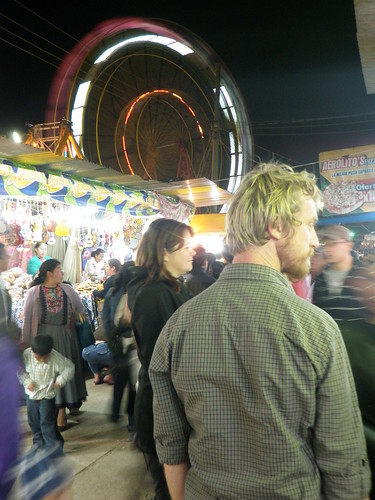
Friday and Saturday were "travel days", which is a nice way of saying that I spent around 30 hours on a shuttle or plane, or in the airport attempting to sleep. But I was on my way to see Caleb, so it was well worth it. After I met up with him on Saturday, then commenced a whirlwind week of Canadian-ness. The Canadian Rockies, I am sorry to say to my Colorado friends, trounce the Colorado ones. Banff and Jasper National Parks are simply gorgeous. The birch and aspen were turning in the park during our trip too, so every vista was a bit more stunning than usual.
We stayed for a few days in Lake Louise,
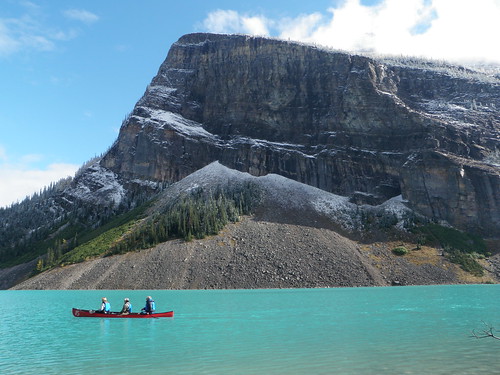

then headed north to Jasper,
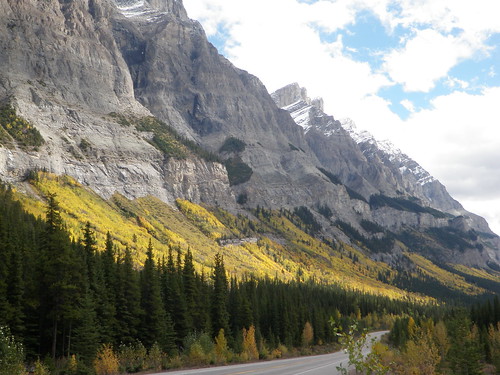
and west to Golden, where we got in some good trail runs, tramped around on mountains, saw a ton of glaciers, waded in some natural hot springs, and drank a lot of Canadian beer. All-in-all, my Canadian vacation went entirely too quickly, and having spent that time with Caleb reminded me of how good I have it with him. It was hard saying goodbye at the airport, but at least this time it will "only" be 2.5 months until I see him again. Next time he's coming to visit me in Guatemala!
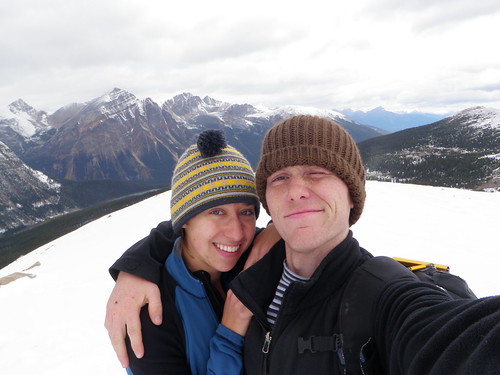
On Tuesday night most of the city gathered in Parque Central or the Minerva Temple to listen to music and watch a few nighttime parades, but it seems mostly people went to Parque Central to stand around and stare at the groups of gringos who were drunk and/or dancing. My group definitely was an "and".

Wednesday we didn't have classes, but we gathered at the school anyway to BBQ, study, play round-the-world ping pong, and watch movies. Tasty and fun.
Thursday was class and fair. Fair = insane, but really, a lot like any fair anywhere else in the world: tons of tasty, greasy food, really expensive games that /seem/ easy, vendors vending all kinds of crappy merchandise, and carnival rides. Despite mostly being the same rides you can get on in the States, the rides were probably the most memorable. Take, for example, the Ferris Wheel. People, this thing was /scary/. And this is coming from someone who has spent countless summers (and hundreds of dollars) at Cedar Point, the most awesome roller coaster park on the planet. Here's why: 1. two person seats made of old, bendy wood that have seen a bit too much exposure to Guatemala's rains; 2. the safety bar and pin were a gate of two metal tubes held in place by a large nail bent in half; 3. the sucker spun /fast/. Like, airborne at the top, fast.

Friday and Saturday were "travel days", which is a nice way of saying that I spent around 30 hours on a shuttle or plane, or in the airport attempting to sleep. But I was on my way to see Caleb, so it was well worth it. After I met up with him on Saturday, then commenced a whirlwind week of Canadian-ness. The Canadian Rockies, I am sorry to say to my Colorado friends, trounce the Colorado ones. Banff and Jasper National Parks are simply gorgeous. The birch and aspen were turning in the park during our trip too, so every vista was a bit more stunning than usual.
We stayed for a few days in Lake Louise,


then headed north to Jasper,

and west to Golden, where we got in some good trail runs, tramped around on mountains, saw a ton of glaciers, waded in some natural hot springs, and drank a lot of Canadian beer. All-in-all, my Canadian vacation went entirely too quickly, and having spent that time with Caleb reminded me of how good I have it with him. It was hard saying goodbye at the airport, but at least this time it will "only" be 2.5 months until I see him again. Next time he's coming to visit me in Guatemala!

Friday, September 10, 2010
Week 8: Great expectations
I learned the perfect tense last week, which brings the Spanish verb tense count up to ten. To use an English verb as an example, ten verb tenses is the equivalent of saying the following:
I learn, I am learning, I'm going to learn, I will learn, I used to learn, I learned, I have learned, I had learned, I will be learning, and the command, "Learn!"
I still have the subjunctive and the conditional to go, which are kind of tough from what I've heard. But for the most part, the tenses I know now are more than enough to get my point across. What is still lacking is the vocabulary and the speed; I speak very simply and about as slowly as someone with Broca's aphasia.
****
Friday was Cathy's birthday. She is one of my host sisters, and she turned 22. In typical Guatemalan style, we lit off fireworks in front of the house at 6am, and that night she had her friends over to the house for a party. Dinner was chorizo tacos. Here's the preparation: a flat, floppy fried corn tortilla with about a tablespoon of ground chorizo, topped with pico de gallo, diced cucumber and onion, salsa de aguacate (avocado sauce), salsa verde (a spicy tomatillo-based green salsa), and chirmol (another spicy salsa made from charred chile zambos). They are served three to a plate, and are super tasty. About forty people came, so the preparation was pretty extensive, e.g. my mom cooked up fifteen pounds of chorizo, and fried about 150 tortillas on the plancha.

Other than perhaps the fireworks and the food, the party wasn't much different from other birthday parties I've attended. Perhaps the biggest difference was that presents aren't opened at the party; kind of like a wedding, they're usually opened the morning after.
In other news, this week is going to be crazy. It is Independence Week, so there are parades, pageants, fairs, and concerts galore. The big days are tomorrow and Wednesday. Independence Day is Wednesday, but on Independence Eve there's a free concert with bands playing everything and everyone drinking everything. At midnight the mayor gives a long speech called the "grito de independencia", and afterward everyone continues drinking. To aid in the latter, the bars remain open all night long. The next day most of the city, probably hung over, heads to the fairgrounds. We don't have class that day, so I will probably sleep in and spend the day studying (our school is planning on going to the fair on Thursday).
Friday is a big day too, because I'll be heading to the airport that day. The airport, you say? Yes, the airport. Because...strangely, crazily, ridiculously enough, I'm flying to Canada to spend a week with Caleb!
What the heck, right? Well, it turns out one of his papers was accepted at a conference in Lake Louise. He emailed me a couple days ago saying that, if I wanted to, he'd help pay for the ticket from Guatemala to Calgary, which would make it cheaper than than paying for a week of class at Pop Wuj. He'd cover the car and hotel, so I'd just have to pay for food. How could I say no?
We'll be at this hotel for four days, and probably driving around Banff trail running, climbing, and hiking for two days before and two days after.
This trip is quite serendipitous, because I was planning on taking time off during that week, anyway; I had decided that I needed a break from continually cramming in new Spanish grammar and vocabulary, and needed to take a week to organize things in my head and cement what Spanish I had learned. So I'll still be doing that, but I'll just be in Canada, with my boyfriend, whom I haven't seen in 3.5 months. FYI, when I get back I'll still have the same family and the same teacher.
I'm looking forward to this week :)
I learn, I am learning, I'm going to learn, I will learn, I used to learn, I learned, I have learned, I had learned, I will be learning, and the command, "Learn!"
I still have the subjunctive and the conditional to go, which are kind of tough from what I've heard. But for the most part, the tenses I know now are more than enough to get my point across. What is still lacking is the vocabulary and the speed; I speak very simply and about as slowly as someone with Broca's aphasia.
****
Friday was Cathy's birthday. She is one of my host sisters, and she turned 22. In typical Guatemalan style, we lit off fireworks in front of the house at 6am, and that night she had her friends over to the house for a party. Dinner was chorizo tacos. Here's the preparation: a flat, floppy fried corn tortilla with about a tablespoon of ground chorizo, topped with pico de gallo, diced cucumber and onion, salsa de aguacate (avocado sauce), salsa verde (a spicy tomatillo-based green salsa), and chirmol (another spicy salsa made from charred chile zambos). They are served three to a plate, and are super tasty. About forty people came, so the preparation was pretty extensive, e.g. my mom cooked up fifteen pounds of chorizo, and fried about 150 tortillas on the plancha.

Other than perhaps the fireworks and the food, the party wasn't much different from other birthday parties I've attended. Perhaps the biggest difference was that presents aren't opened at the party; kind of like a wedding, they're usually opened the morning after.
In other news, this week is going to be crazy. It is Independence Week, so there are parades, pageants, fairs, and concerts galore. The big days are tomorrow and Wednesday. Independence Day is Wednesday, but on Independence Eve there's a free concert with bands playing everything and everyone drinking everything. At midnight the mayor gives a long speech called the "grito de independencia", and afterward everyone continues drinking. To aid in the latter, the bars remain open all night long. The next day most of the city, probably hung over, heads to the fairgrounds. We don't have class that day, so I will probably sleep in and spend the day studying (our school is planning on going to the fair on Thursday).
Friday is a big day too, because I'll be heading to the airport that day. The airport, you say? Yes, the airport. Because...strangely, crazily, ridiculously enough, I'm flying to Canada to spend a week with Caleb!
What the heck, right? Well, it turns out one of his papers was accepted at a conference in Lake Louise. He emailed me a couple days ago saying that, if I wanted to, he'd help pay for the ticket from Guatemala to Calgary, which would make it cheaper than than paying for a week of class at Pop Wuj. He'd cover the car and hotel, so I'd just have to pay for food. How could I say no?
We'll be at this hotel for four days, and probably driving around Banff trail running, climbing, and hiking for two days before and two days after.
This trip is quite serendipitous, because I was planning on taking time off during that week, anyway; I had decided that I needed a break from continually cramming in new Spanish grammar and vocabulary, and needed to take a week to organize things in my head and cement what Spanish I had learned. So I'll still be doing that, but I'll just be in Canada, with my boyfriend, whom I haven't seen in 3.5 months. FYI, when I get back I'll still have the same family and the same teacher.
I'm looking forward to this week :)
Wednesday, September 1, 2010
Week 7: Fiestas & Mudslides
Last Tuesday was Merete's birthday, so we ate cake and attempted to sing "Happy Birthday" in Spanish at the school. Then later in the evening everyone went out to a tapas bar and drank a whole lot of wine. Unfortunately (sorry, Merete!) I got absolutely zero good pictures of either event. Wednesday I went with a group of folks and played a bit of indoor soccer, and was sore for the next three days.
On Thursday we went up to a village in which our school had previously been very active with social projects. Over the last ten years Pop Wuj has built dozens of stoves there, given many children scholarships to attend primary school, and reforested some of the surrounding hills. So as a token of the village's gratitude, each year during the first harvest of elote they have a small fiesta for Pop Wuj. This basically means that once a year most of the school hops in a shuttle, heads up to the village, and everyone stuffs their face silly with super fresh and delicious sweet corn served up by the community leader's family. It was easily be best corn I've ever had.
It may look like plain ol' corn on the cob, but no, it is elote, and it is much more delicious. It is usually prepared in one of two ways: the more sane way is to squeeze some fresh lime juice onto the cob, sprinkle it with salt, and nibble off individual kernels. The crazier way, and hence why this particular preparation is called "elote loco", is to paint the ear of corn with stripes of mayo, ketchup, and picante sauce, and then garnish with a sprinkle of Parmesan cheese. Eating elote this way is ultimately a bit sloppier (and more fun). I, of course, prefer the crazy corn method. Here's a photo of Merete and Shuvani showing off their cobs:

I and most folks ate three cobs of corn, and were completely, totally stuffed afterward. But my teacher Ulises and Shuvani, one of the students here, got into a corn-eating contest. They tied by eating /seven/ cobs of corn. Seven! I'm sure Kobayashi could have eaten ten times as much, but for us mere mortals it was quite impressive watching those two go at it.
Also, the village kids that ate elote with us were extremely photogenic. Here are a couple of my favorite pictures of them:
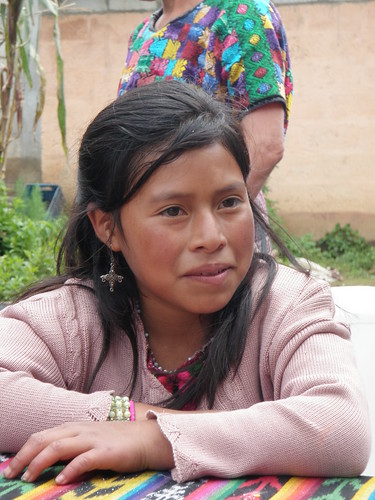
and
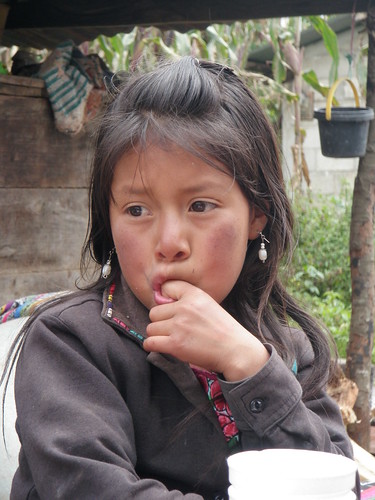
****
Last Thursday Merete, Tom, Shuvani, Amy, and I cooked for the school dinner, and it was delicious. We made a Norwegian fish stew accompanied by whole wheat garlic bread and buttered grean beans. Dessert was chocobananas and cookies. And of course there was a whole bunch of wine. One of the teachers informed us that, in his 20 years of teaching at Pop Wuj, our group was only the second to attempt a fish dish. Good job, us! We had a ton of stew, bread, and cookie dough left over too, so we had another dinner of fish stew on Friday night while watching a movie at the school.
The weekend itself was pretty tranquil. I studied a bunch in coffee shops with friends, watched Casino Royale at a movie cafe (also with friends), and went to the mall with Matt Percy and Tom. We went to see if any of us could find some pants and shoes, since all of us had packed light. We first went to a Kohls- or JC Penny's- sized store that sells off-brand clothing of surprisingly good quality at surprisingly cheap prices. After talking with my teacher about this store I learned that, because a lot of designer clothes in America are made in Guatemalan sweat shops, it is fairly easy for the employees of said sweatshops to work for, say, American Eagle by day, and after work to make the same pants in their homes and then sell them on the streets. If you become successful enough at doing this you can start your own company, say, American Goose, and start selling your product to stores like the one I visited on Saturday. So there were all kinds of hilarious brands at this store: New Navy, Hollistar, Tom Cruise, Fac'q Jeans, Aeropostal, etc. But in my opinion the most appropriate name of all was the name of the store: Carrion.
Unfortunately for me, all of the women's jeans were blinged to kingdom come with sequins and elaborate stitching. If I were to start wearing clear platform heels those jeans might start looking appropriate on me, but since I spend most of my day sitting I imagine all those glued-on gems would be pretty uncomfortable for my bottom. I couldn't find good shoes either. Matt did well, though: he got a pair of soccer shorts, a pair of Inside jeans, and orange and yellow Diadora indoor shoes, all for $40.
****
Despite having a dearth of pants and shoes, life is good. The foot fungus is dying and I haven't gotten any new chinche bites, although I was attacked by a flea a few days ago and am still itchy from that. Fleas also happen to be especially common here, perhaps because of the incredible numbers of stray dogs that live in Guatemala. So any family that has dogs or cats is bound to get fleas once in a while. Since my family has both, I make sure neither get into my room. That has worked well, but unfortunately I can't do much about the random flea that is hiding out in a cafe chair.
****
Some of you may have heard on the news about the mudslides in Guatemala last weekend. What happened was that we had a tropical depression sitting over Guatemala on Saturday and Sunday and got a /ton/ of rain. Unfortunately this caused multiple mudslides along several sections of the highways in this area. At least 40 people died in the slides, and dozens more are still missing. Sadly, most of the victims so far were volunteers who were trying to pull people from buses buried in mud from an initial highway mudslide, and then were caught in a second, larger collapse. The news stations down here don't do much (read: almost none at all) censoring, so watching the coverage of the disasters has been difficult, to say the least. Luckily the rain has let up a bit, so hopefully the recovery operation can resume again so families can receive a bit of closure.
The roads themselves are in pretty terrible condition because of dozens of smaller landslides that fell onto the highway; new students that arrived today said that the trip from Antigua to Xela, which normally takes 3.5 hours, took them 14 because of road conditions. This weekend I was planning on heading to the mercado at Chichicastenago, which is in the direction of Antigua, but it seems as though that isn't an option at this point.
****
Next week should be exciting: it is Guatemala's equivalent of Independence Day, and from what I've heard, Guatemalans may get more crazy about their independence than Americans do. I'm looking forward to it :)
On Thursday we went up to a village in which our school had previously been very active with social projects. Over the last ten years Pop Wuj has built dozens of stoves there, given many children scholarships to attend primary school, and reforested some of the surrounding hills. So as a token of the village's gratitude, each year during the first harvest of elote they have a small fiesta for Pop Wuj. This basically means that once a year most of the school hops in a shuttle, heads up to the village, and everyone stuffs their face silly with super fresh and delicious sweet corn served up by the community leader's family. It was easily be best corn I've ever had.
It may look like plain ol' corn on the cob, but no, it is elote, and it is much more delicious. It is usually prepared in one of two ways: the more sane way is to squeeze some fresh lime juice onto the cob, sprinkle it with salt, and nibble off individual kernels. The crazier way, and hence why this particular preparation is called "elote loco", is to paint the ear of corn with stripes of mayo, ketchup, and picante sauce, and then garnish with a sprinkle of Parmesan cheese. Eating elote this way is ultimately a bit sloppier (and more fun). I, of course, prefer the crazy corn method. Here's a photo of Merete and Shuvani showing off their cobs:

I and most folks ate three cobs of corn, and were completely, totally stuffed afterward. But my teacher Ulises and Shuvani, one of the students here, got into a corn-eating contest. They tied by eating /seven/ cobs of corn. Seven! I'm sure Kobayashi could have eaten ten times as much, but for us mere mortals it was quite impressive watching those two go at it.
Also, the village kids that ate elote with us were extremely photogenic. Here are a couple of my favorite pictures of them:

and

****
Last Thursday Merete, Tom, Shuvani, Amy, and I cooked for the school dinner, and it was delicious. We made a Norwegian fish stew accompanied by whole wheat garlic bread and buttered grean beans. Dessert was chocobananas and cookies. And of course there was a whole bunch of wine. One of the teachers informed us that, in his 20 years of teaching at Pop Wuj, our group was only the second to attempt a fish dish. Good job, us! We had a ton of stew, bread, and cookie dough left over too, so we had another dinner of fish stew on Friday night while watching a movie at the school.
The weekend itself was pretty tranquil. I studied a bunch in coffee shops with friends, watched Casino Royale at a movie cafe (also with friends), and went to the mall with Matt Percy and Tom. We went to see if any of us could find some pants and shoes, since all of us had packed light. We first went to a Kohls- or JC Penny's- sized store that sells off-brand clothing of surprisingly good quality at surprisingly cheap prices. After talking with my teacher about this store I learned that, because a lot of designer clothes in America are made in Guatemalan sweat shops, it is fairly easy for the employees of said sweatshops to work for, say, American Eagle by day, and after work to make the same pants in their homes and then sell them on the streets. If you become successful enough at doing this you can start your own company, say, American Goose, and start selling your product to stores like the one I visited on Saturday. So there were all kinds of hilarious brands at this store: New Navy, Hollistar, Tom Cruise, Fac'q Jeans, Aeropostal, etc. But in my opinion the most appropriate name of all was the name of the store: Carrion.
Unfortunately for me, all of the women's jeans were blinged to kingdom come with sequins and elaborate stitching. If I were to start wearing clear platform heels those jeans might start looking appropriate on me, but since I spend most of my day sitting I imagine all those glued-on gems would be pretty uncomfortable for my bottom. I couldn't find good shoes either. Matt did well, though: he got a pair of soccer shorts, a pair of Inside jeans, and orange and yellow Diadora indoor shoes, all for $40.
****
Despite having a dearth of pants and shoes, life is good. The foot fungus is dying and I haven't gotten any new chinche bites, although I was attacked by a flea a few days ago and am still itchy from that. Fleas also happen to be especially common here, perhaps because of the incredible numbers of stray dogs that live in Guatemala. So any family that has dogs or cats is bound to get fleas once in a while. Since my family has both, I make sure neither get into my room. That has worked well, but unfortunately I can't do much about the random flea that is hiding out in a cafe chair.
****
Some of you may have heard on the news about the mudslides in Guatemala last weekend. What happened was that we had a tropical depression sitting over Guatemala on Saturday and Sunday and got a /ton/ of rain. Unfortunately this caused multiple mudslides along several sections of the highways in this area. At least 40 people died in the slides, and dozens more are still missing. Sadly, most of the victims so far were volunteers who were trying to pull people from buses buried in mud from an initial highway mudslide, and then were caught in a second, larger collapse. The news stations down here don't do much (read: almost none at all) censoring, so watching the coverage of the disasters has been difficult, to say the least. Luckily the rain has let up a bit, so hopefully the recovery operation can resume again so families can receive a bit of closure.
The roads themselves are in pretty terrible condition because of dozens of smaller landslides that fell onto the highway; new students that arrived today said that the trip from Antigua to Xela, which normally takes 3.5 hours, took them 14 because of road conditions. This weekend I was planning on heading to the mercado at Chichicastenago, which is in the direction of Antigua, but it seems as though that isn't an option at this point.
****
Next week should be exciting: it is Guatemala's equivalent of Independence Day, and from what I've heard, Guatemalans may get more crazy about their independence than Americans do. I'm looking forward to it :)
Friday, August 27, 2010
Week 6: Mellow Amarillo
Last week was pretty mellow, relatively speaking. Over the weekend some folks went to Antigua, some to Lago de Atitlan, some to the beach, but I opted to stay in Xela and study at my favorite coffee shops. It is hard to quantify how much I "got done", since what I really need to improve on is my familiarity with verb tenses and ability to access vocabulary, but I did find it easier to chat with my teacher on Monday morning, so there was some form of progress.
Earlier in the week a couple things happened worth sharing. On Wednesday a group of us went up to Tierra Colorada, a pueblo about 20 minutes up into the mountains by chicken bus, to finish up a stove. Previously when I've volunteered for the stove project the original cooking apparatus had been removed, but this time the "after" was right next to the "before". Here's the before:
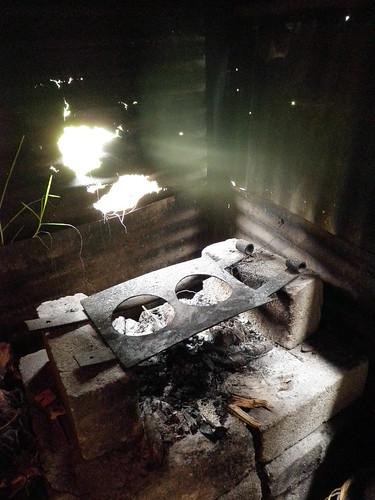
And here's the after:
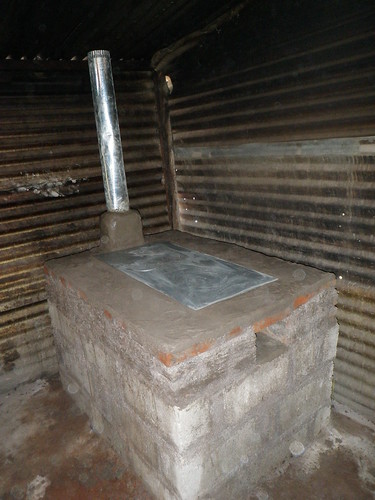
Pretty amazing, no? The change was made all the more poignant because the family happened to be boiling corn while we were finishing up the new stove in the other corner of the kitchen, and the smoke from the fire pit covered the top foot of the kitchen ceiling. This wasn't too much of a problem if you were pushing five feet (a common height for folks living in the mountains), but if you happened to be any taller your head was stuck in it. The cough and burning eyes the smoke imparted was expected, but what was surprising was the almost irrepressible urge to drop to my hands and knees and crawl to the nearest exit. If there had actually been a door at the exit I'm sure I would've tapped on the doorknob to see if it was hot before grabbing it, too. Thank you, Safety Town.
On Friday my maestro and I and a few other folks went to San Francisco el Alto to wander around the weekly market there. The city is smallish and very hilly, but several times a week all of the streets become filled with people vending anything from baby dresses to goats to empanadas to earrings. I didn't need to buy anything, so I just took pictures. My favorite area was an open space at the top of the tallest hill in the city, where the animal market was.
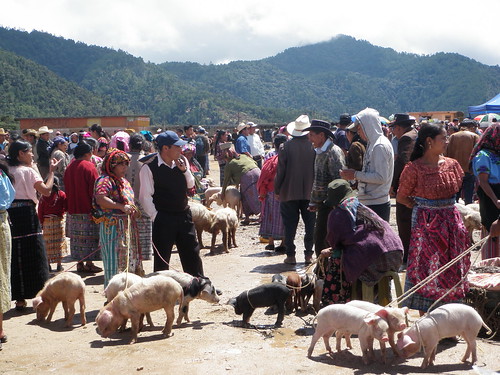
At first glance it seemed like a mosh of folks slowly strolling around with animals on twine leashes, but after a bit you noticed the constant price-calling, eye-balling, and exchanging of Quetzales and handles of leashes. It was kind of exciting to watch, except I felt bad for the poor animals.
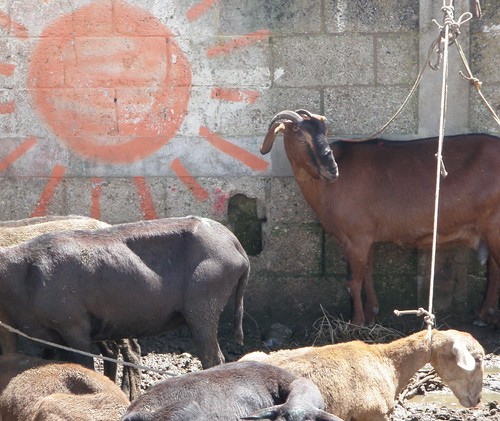
At one point I asked how much a little piglet was going for. Without bartering, and probably getting heavily taxed for being a gringa, the lady told me Q350, about $43. If you're a hard bargainer you can usually get half of their initial offer, so now I know where to go if I ever need a piglet on the cheap :)
Tomorrow a group of us are cooking dinner at the school. I, of course, am in charge of one half of the dessert. I say "one half" because for the last three weeks of dinner there hasn't been a dessert (for shame!), so we've decided to make two desserts in an attempt to satisfy the dessert gods. I'll be making chocobananas, i.e., a banana on a stick dipped in chocolate and rolled in nuts. Yum.
And, still no chinche bites! :D
Earlier in the week a couple things happened worth sharing. On Wednesday a group of us went up to Tierra Colorada, a pueblo about 20 minutes up into the mountains by chicken bus, to finish up a stove. Previously when I've volunteered for the stove project the original cooking apparatus had been removed, but this time the "after" was right next to the "before". Here's the before:

And here's the after:

Pretty amazing, no? The change was made all the more poignant because the family happened to be boiling corn while we were finishing up the new stove in the other corner of the kitchen, and the smoke from the fire pit covered the top foot of the kitchen ceiling. This wasn't too much of a problem if you were pushing five feet (a common height for folks living in the mountains), but if you happened to be any taller your head was stuck in it. The cough and burning eyes the smoke imparted was expected, but what was surprising was the almost irrepressible urge to drop to my hands and knees and crawl to the nearest exit. If there had actually been a door at the exit I'm sure I would've tapped on the doorknob to see if it was hot before grabbing it, too. Thank you, Safety Town.
On Friday my maestro and I and a few other folks went to San Francisco el Alto to wander around the weekly market there. The city is smallish and very hilly, but several times a week all of the streets become filled with people vending anything from baby dresses to goats to empanadas to earrings. I didn't need to buy anything, so I just took pictures. My favorite area was an open space at the top of the tallest hill in the city, where the animal market was.

At first glance it seemed like a mosh of folks slowly strolling around with animals on twine leashes, but after a bit you noticed the constant price-calling, eye-balling, and exchanging of Quetzales and handles of leashes. It was kind of exciting to watch, except I felt bad for the poor animals.

At one point I asked how much a little piglet was going for. Without bartering, and probably getting heavily taxed for being a gringa, the lady told me Q350, about $43. If you're a hard bargainer you can usually get half of their initial offer, so now I know where to go if I ever need a piglet on the cheap :)
Tomorrow a group of us are cooking dinner at the school. I, of course, am in charge of one half of the dessert. I say "one half" because for the last three weeks of dinner there hasn't been a dessert (for shame!), so we've decided to make two desserts in an attempt to satisfy the dessert gods. I'll be making chocobananas, i.e., a banana on a stick dipped in chocolate and rolled in nuts. Yum.
And, still no chinche bites! :D
Tuesday, August 24, 2010
Week 5: Get it in Guate
I am experiencing a lot of "firsts" in Guatemala. I hope, at the end of my time here, the most memorable ones will pertain to speaking Spanish, living with my family, and experiencing the culture, but for blog fodder there are definitely a couple more interesting, and more unfortunate, ones that are happening right now.
Of course, the one that has been at the front of my consciousness has been dealing with bedbugs. Many of you have been very helpful, sending me articles on how to combat the little f'ers, but I've also been told things like "good luck, but bedbugs are almost impossible to get rid of". That said, I have tentative good news: I haven't gotten any new bites in ten nights! If the chinches are indeed D-E-D, I will happily share the likely reason we were successful. It has to do with this article: Ohio Asks E.P.A. to Lift Ban on Use of Propoxur
From what I've been reading on the interwebs, the United States is experiencing a /huge/ resurgence in bedbug infestations, largely due to resistance to over-the-counter insecticides, and a lack of public knowledge on how to identify and combat the critters. Indeed, before coming to Guate, I had only heard things like, "Oh, avoid that apartment complex, they have bedbugs," and I couldn't have told you anything more on the subject. Ohio is having a worse time than most (true for many things), so the state is pressing the FDA to lift a ban on propoxur which is only slightly less effective than DDT at killing bedbugs. Anyway, a couple weeks back I was at the mercado buying insecticide, and lo and behold, there was propoxur on the list of active ingredients! Yup, the industrial insecticide banned in the USA because of it's crazy toxicity to humans is available everywhere in Guatemala, and I currently have a thick layer of it covering my floor, walls, and mattresses. There's a good chance my firstborn child will have three heads because of the stuff, but it looks like it killed the bedbugs, so I'm going to say it is well worth it.
By sharing this next "first" I am running the risk of never getting a foot massage from Caleb ever again, but here it is: probably because my feet are eternally damp here in Xela (I wear my Chacos in the shower and it always rains in the afternoons), I have a bit of athlete's foot between two toes. Ew. This isn't a big deal for many folks, but for this here hypochondriac medical student, I want the fungus DEAD, right now. Especially because the fungus is only one toe away from my big toenail, which is still all messed up from running. You see, damaged toenails are cozy spots for fungus to grow, and the last thing I want is this.
Usually a combination of keeping the area dry (and therefore inhospitable to fungus) and applying a topical fungicide will get rid of athlete's foot, so I went to one of the many pharmacies in Guatemala to get some ketoconazole cream. As I've written about earlier, I had prepared a short conversation in my head in which I quickly and successfully bought ketoconazole cream from the pharmacist. But as you may guess, the conversation went nothing like I was expecting: when I asked for ketoconazole cream, the pharmacist looked at me, took a deep breath, and began rattling off every antifungal imaginable for purchase. People (med students and doctors, especially), you can buy oral grisofulvin and terbinafine over the counter here! Or almost any other medicine imaginable, for that matter. You just have to know what to ask for. So after I got over the shock of this realization, I politely declined the smorgasbord she offered me, and asked again for plain ol' antifungal cream. Two ounces of it cost me $1.50, a tenth of the US price. So yup, the pharmacies are super cheap here, too.
***
Enough with infestations and infections. How is Guatemala? How are my studies going? All pretty well, I'd say. My Spanish is getting better each day; I still am speaking very slowly, very simply, and very incorrectly, but I can get my point across most of the time. The hardest thing so far has been conjugating verbs. It is tough to choose the right tense and verb ending within the split second required to not sound like a stuttering idiot ("Ella tien- no, ha...hi...hic...hiz...hizo. Hizo! Ella hizo un montón de tarea anoche."). I'm working on it.
My family is great. They're beginning to realize that I can understand much of what they're saying at the dinner table (I'm pretty amazed, too), so they're engaging me more, I'm speaking more, we're bonding, it's good. Rodrigo, the grandson of the house, has warmed up to me considerably. He used to hide behind one of his aunts whenever I entered the room, but nowadays he likes to take me on adventures around the tiny courtyard, where we usually end up chasing the cat, Sol, together. Here's a picture of him pouting right after Luna, the beagle, took his stuffed animal:
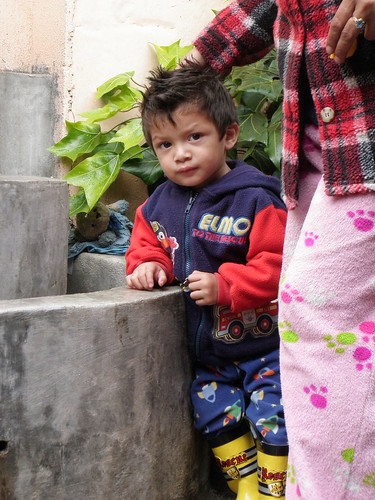
Most of my activities haven't been picture worthy, so I apologize for the dearth of photos. I should have some good photos after tomorrow, because I'm going to San Francisco el Alto, the biggest mercado in Central America. It is basically the less touristy, more down-and-dirty version of Chichicastenango, the mercado I was planning on going to last weekend (those plans fell through, but I'll go eventually). So instead of leaving y'all with a photo, I'll tell you about a small cultural difference I found interesting:
Guatemalans point with their lips. My first few weeks here I thought the people I asked for directions were suggesting I kiss them. But no, they're just pointing in a more efficient manner :)
Of course, the one that has been at the front of my consciousness has been dealing with bedbugs. Many of you have been very helpful, sending me articles on how to combat the little f'ers, but I've also been told things like "good luck, but bedbugs are almost impossible to get rid of". That said, I have tentative good news: I haven't gotten any new bites in ten nights! If the chinches are indeed D-E-D, I will happily share the likely reason we were successful. It has to do with this article: Ohio Asks E.P.A. to Lift Ban on Use of Propoxur
From what I've been reading on the interwebs, the United States is experiencing a /huge/ resurgence in bedbug infestations, largely due to resistance to over-the-counter insecticides, and a lack of public knowledge on how to identify and combat the critters. Indeed, before coming to Guate, I had only heard things like, "Oh, avoid that apartment complex, they have bedbugs," and I couldn't have told you anything more on the subject. Ohio is having a worse time than most (true for many things), so the state is pressing the FDA to lift a ban on propoxur which is only slightly less effective than DDT at killing bedbugs. Anyway, a couple weeks back I was at the mercado buying insecticide, and lo and behold, there was propoxur on the list of active ingredients! Yup, the industrial insecticide banned in the USA because of it's crazy toxicity to humans is available everywhere in Guatemala, and I currently have a thick layer of it covering my floor, walls, and mattresses. There's a good chance my firstborn child will have three heads because of the stuff, but it looks like it killed the bedbugs, so I'm going to say it is well worth it.
By sharing this next "first" I am running the risk of never getting a foot massage from Caleb ever again, but here it is: probably because my feet are eternally damp here in Xela (I wear my Chacos in the shower and it always rains in the afternoons), I have a bit of athlete's foot between two toes. Ew. This isn't a big deal for many folks, but for this here hypochondriac medical student, I want the fungus DEAD, right now. Especially because the fungus is only one toe away from my big toenail, which is still all messed up from running. You see, damaged toenails are cozy spots for fungus to grow, and the last thing I want is this.
Usually a combination of keeping the area dry (and therefore inhospitable to fungus) and applying a topical fungicide will get rid of athlete's foot, so I went to one of the many pharmacies in Guatemala to get some ketoconazole cream. As I've written about earlier, I had prepared a short conversation in my head in which I quickly and successfully bought ketoconazole cream from the pharmacist. But as you may guess, the conversation went nothing like I was expecting: when I asked for ketoconazole cream, the pharmacist looked at me, took a deep breath, and began rattling off every antifungal imaginable for purchase. People (med students and doctors, especially), you can buy oral grisofulvin and terbinafine over the counter here! Or almost any other medicine imaginable, for that matter. You just have to know what to ask for. So after I got over the shock of this realization, I politely declined the smorgasbord she offered me, and asked again for plain ol' antifungal cream. Two ounces of it cost me $1.50, a tenth of the US price. So yup, the pharmacies are super cheap here, too.
***
Enough with infestations and infections. How is Guatemala? How are my studies going? All pretty well, I'd say. My Spanish is getting better each day; I still am speaking very slowly, very simply, and very incorrectly, but I can get my point across most of the time. The hardest thing so far has been conjugating verbs. It is tough to choose the right tense and verb ending within the split second required to not sound like a stuttering idiot ("Ella tien- no, ha...hi...hic...hiz...hizo. Hizo! Ella hizo un montón de tarea anoche."). I'm working on it.
My family is great. They're beginning to realize that I can understand much of what they're saying at the dinner table (I'm pretty amazed, too), so they're engaging me more, I'm speaking more, we're bonding, it's good. Rodrigo, the grandson of the house, has warmed up to me considerably. He used to hide behind one of his aunts whenever I entered the room, but nowadays he likes to take me on adventures around the tiny courtyard, where we usually end up chasing the cat, Sol, together. Here's a picture of him pouting right after Luna, the beagle, took his stuffed animal:

Most of my activities haven't been picture worthy, so I apologize for the dearth of photos. I should have some good photos after tomorrow, because I'm going to San Francisco el Alto, the biggest mercado in Central America. It is basically the less touristy, more down-and-dirty version of Chichicastenango, the mercado I was planning on going to last weekend (those plans fell through, but I'll go eventually). So instead of leaving y'all with a photo, I'll tell you about a small cultural difference I found interesting:
Guatemalans point with their lips. My first few weeks here I thought the people I asked for directions were suggesting I kiss them. But no, they're just pointing in a more efficient manner :)
Tuesday, August 17, 2010
Week 4: Mejor
The battle with the bed bugs continues, but I think the humans are winning. Both of my moms have been really helpful: Guate-mom has been helping me coat my room in insecticide, and US-mom has sent me an essentially-hermetic mattress cover. The latter will be helpful in case they're not all killed by the time it actually arrives in the mail.
I have a feeling there are still a couple left, because I got a few new bites two nights ago. Since then I've reinspected the mattresses, sheets and bed frame and sprayed all over the place, and it has been quiet. But I have yet to actually find one of the f'ers, so it is difficult to say if they've done died or are just hiding out digesting their last blood meal. Regardless, thanks for all the well-wishes concerning the chinches! Hopefully next week I'll have good news to report.
Bedbugs aside, last week was fairly quiet. On Thursday we said goodbye to a whole slew of folks at the school dinner, which was chicken curry this time. As I'd hoped, it was quite tasty. Bonus: it was supplemented by rum drinks made with actual coconuts. Here's a shot of Katy preparing one (for some reason I've only taken pictures of her while she's wielding a machete).
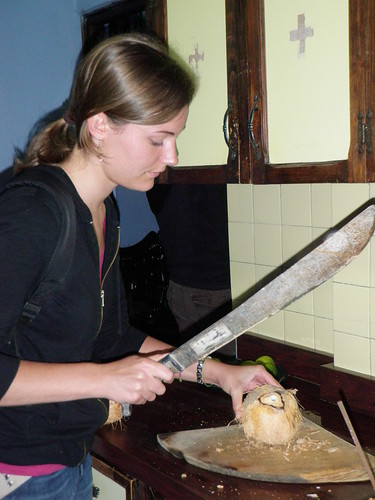
Other than that, last week and weekend consisted of learning the future tenses with my teacher Ulises; studying at local coffee shops with Merete, my favorite Norwegian (see picture below); and going out dancing with new and old friends.
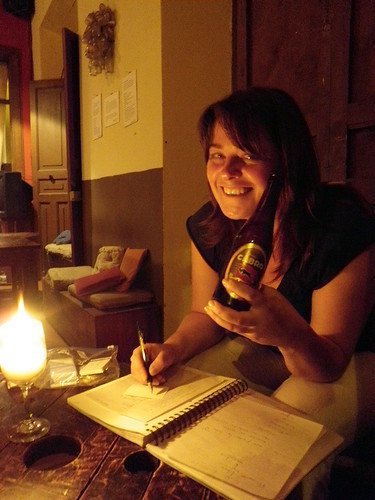
Yesterday the power was out at our house for the whole day, so we prepared tacos by candlelight. Here's a shot of daughters #3 & #4, Jessiecka & Cathy, as well as my Guate-mom Lucrecia.
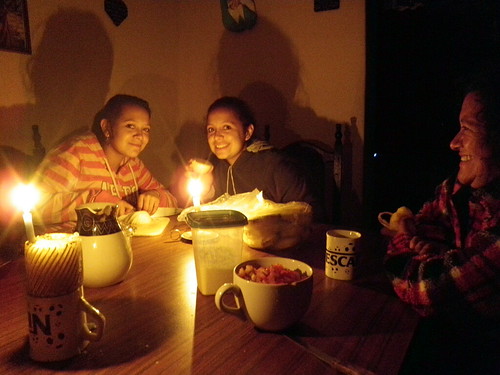
Tacos in Guatemala, and seemingly everywhere else besides Taco Bell/the United States, consist of a 3" soft corn tortilla with a bit of meat, pico de gallo, salsa (usually a salsa called chirmol in this region), and a touch of lime on top. They're really tasty.
My Guate-mom cooks three meals a day for the family and me, and I'm really enjoying the "comida tipica". It is true that many meals consist of some combination of black beans, tortilla, eggs, and salsa, but there's a surprising amount of variation and supplementation, and I haven't been bored. Nor haven't I really started eating food from the street vendors, and that's a whole other world of culinary goodness (and traveler's diarrhea). I will be posting more on this topic in the near future.
And that's that. Next week's post should be more interesting, since this weekend Merete and I are going to Chichicastenango. "Chichi" has the largest indigenous mercado in Guatemala, so it is the place to go if you're interested in buying anything handmade.
I have a feeling there are still a couple left, because I got a few new bites two nights ago. Since then I've reinspected the mattresses, sheets and bed frame and sprayed all over the place, and it has been quiet. But I have yet to actually find one of the f'ers, so it is difficult to say if they've done died or are just hiding out digesting their last blood meal. Regardless, thanks for all the well-wishes concerning the chinches! Hopefully next week I'll have good news to report.
Bedbugs aside, last week was fairly quiet. On Thursday we said goodbye to a whole slew of folks at the school dinner, which was chicken curry this time. As I'd hoped, it was quite tasty. Bonus: it was supplemented by rum drinks made with actual coconuts. Here's a shot of Katy preparing one (for some reason I've only taken pictures of her while she's wielding a machete).

Other than that, last week and weekend consisted of learning the future tenses with my teacher Ulises; studying at local coffee shops with Merete, my favorite Norwegian (see picture below); and going out dancing with new and old friends.

Yesterday the power was out at our house for the whole day, so we prepared tacos by candlelight. Here's a shot of daughters #3 & #4, Jessiecka & Cathy, as well as my Guate-mom Lucrecia.

Tacos in Guatemala, and seemingly everywhere else besides Taco Bell/the United States, consist of a 3" soft corn tortilla with a bit of meat, pico de gallo, salsa (usually a salsa called chirmol in this region), and a touch of lime on top. They're really tasty.
My Guate-mom cooks three meals a day for the family and me, and I'm really enjoying the "comida tipica". It is true that many meals consist of some combination of black beans, tortilla, eggs, and salsa, but there's a surprising amount of variation and supplementation, and I haven't been bored. Nor haven't I really started eating food from the street vendors, and that's a whole other world of culinary goodness (and traveler's diarrhea). I will be posting more on this topic in the near future.
And that's that. Next week's post should be more interesting, since this weekend Merete and I are going to Chichicastenango. "Chichi" has the largest indigenous mercado in Guatemala, so it is the place to go if you're interested in buying anything handmade.
Sunday, August 8, 2010
Week 3: When Chinches and Pollitos Attack
I have concluded there are one bajillion tenses in Spanish. Okay, a slight exaggeration. But I spent an entire week struggling with two tenses, conjugating verbs incorrectly all over the place, at times frustrated as all get-out, but! slowly learning. And just when I started feeling comfortable with the preterit, boom, my teacher drops the imperfect tense on me, then offhandedly informs me that there are 26 verb tenses total. Totally dismayed, I wikied to check for validity, and it turns out are there only 18 tenses. Only. I can tell you right now, I am already eternally grateful for having taken Frau Crocker's grammar class way back in high school. Knowing what a past participle/auxillary verb/possessive pronoun is has helped keep the frustration at bay. It is also nice having gone through this to a lesser extent with German, which only has six tenses. But wow, learning Spanish is going to be no small feat.
In terms of how my Spanish is doing, I would say it has progressed well. It is hard to quantify, but I can say that am catching more and more of my family's conversation (which is at real-person speed), my teacher and I don't speak English anymore, and I was successfully able to explain what my "We Do What?!" t-shirt meant last week.
Besides studying a whole bunch last week, I did a few fun things:
I went to salsa lessons with friends. No pictures and not much of a story, but really fun by the end. I'm planning on going once a week.
I also attended the weekly school dinner. No one volunteered to cook this week, so we had Dominos. Whomp. If you're wondering, it tastes exactly the same down here, except 1. you eat it with salsa dulce (ketchup), which is kind of tasty; 2. the ham slices are actually ham slices; and 3. the crushed red chili packets are really spicy. Even so, it was still Dominos (I think even Chinese take-out would've been more interesting). Anyway, the meal was saved by the profuse amounts of Gallo and Cabro we all drank. This Thursday we're having chicken curry cooked by an actual Indian, so I'm looking forward to that.
This weekend I went to the beach. Champerico, to be exact. It is on the Pacific coast of Guatemala, and is a popular destination for highland-dwelling folk to go for a daytrip. Ten of such folk, myself included, went there on Saturday. It was a welcome change to be in a place where you can wear shorts comfortably (Xela usually is in the low 70s, sunny and pleasant in the morning, but with heavy rain every afternoon. Long pants and shirt weather most of the time.). And the water! High 70s, at least. I'm tempted to call it bathwater. It was a lot of fun splashing around in it, but swimming wasn't really possible owing to the insanely dangerous undertow. Standing thigh-deep was asking for it, and this the locals knew: anyone, gringo or not, who went deeper than knee-level was watched closely by them, often with cell phones in hand. This way they were ready to take a picture right after the poor bather was bowled over by a wave, tumbled around underwater, and emerged sans bathing suit bottom or top. I spent a couple hours battling the waves, and survived without any indecent photos being taken, but my sinus did get a good saline flush on several occasions.
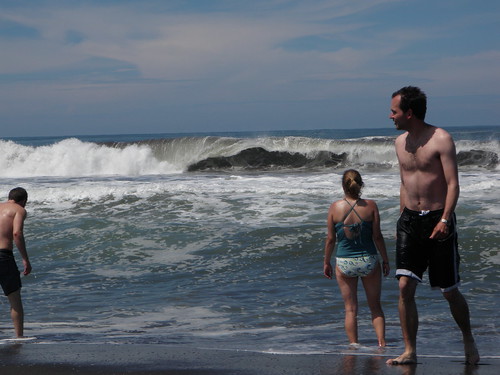
The beach itself was a bit dirty. It is black sand to start with, and there was a fair amount of discarded coconuts, water bottles and beer cans strewn about. But this was made up for by the groups of boys ambling around on horseback. They were fun to watch.
Lunch was an entire red snapper, deep fried, served with salad, fries, and corn tortillas. Delicious! And only $6. Voila:
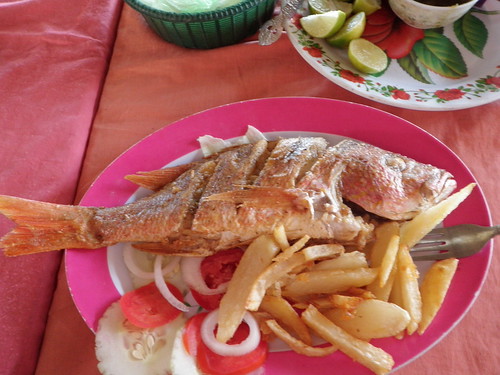
****
Although my days last week were spent studying with friends and a doing a bunch of fun activities, the nights have been a different story. I've not been sleeping well at all. There are two reasons for this:
1. Chinches. You know them as bedbugs. From what I can tell, it is a relatively not-talked-about problem in Guatemala. Ask a teacher or your host mom and you're likely to get a puzzled look (my teacher: "chin-que?") or a staunch denial (a friend's host mom: "you don't have bedbugs, you're just allergic to pork"), but almost half of the students I've talked to here have bedbugs. Show a fellow student your itchy bites and most will inevitably say something to the effect of, "I have those too!" Fortunately for me, my host mom was familiar with bedbugs, although she says it is only a problem with the students and that her family has never had a problem. Her theory is that bedbugs like gringo blood better; my theory is that students tend to be a more mobile population and are more likely to come in contact with them, thus spreading them from bed to bed.
Unfortunately, I confirmed last week that my bed has them. It took me several weeks to be sure because one of the hostels I stayed in at the beginning of my trip also had them really bad, so when I arrived in Xela I already had about a dozen bites on me. The bites last for weeks, so when in the first week I noticed another two or three bites I wasn't sure if they were new, or if they were bites from the hostel which I'd missed on the first inspection. The second week I didn't get any new bites, so I was cautiously optimistic that I'd lucked out and been given a chinche-free family. But last week it seems the bedbugs decided it was Thanksgiving and I was the turkey, because I've gotten another dozen bites since. It has not been pleasant. Perhaps the thought of tiny insects living in your bed and feasting on your blood while you sleep doesn't bother you, but it sure as heck bothers me. Consequently, I've been sleeping terribly, and waking up to new itchy bites just makes things worse.
I had to put up with a few days of new bites because I wanted to be sure-sure that I had them before telling my host mom, since saying you were given a bug-infested bed to sleep in isn't something to say without total confidence. She was understanding, and so we're going to try killing the f'ers. To do so, you put all your clothes and sheets in the wash and Raid the heck out of your bed, dresser, bed frame, wall sockets, etc. This is what mi mama and I did this morning. My fingers are crossed that they were living in one of the places we sprayed. If we didn't, they'll be back*.
2. Pollitos. These dudes made my last two nights even worse:
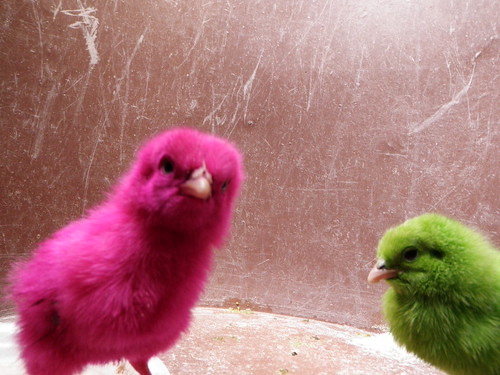
"What the?!", right? These are pollo del dia, and you can buy them in any color imaginable at the market for about Q1 ($0.13).
The sad thing about these guys, as their name suggests, is that they only live for a few days. My host mom claims this is because they're essentially genetic chicken rejects; they can't lay eggs nor will they be especially meaty. Somehow chicken farmers can recognize these guys when they're born. Normally they just kill them. But someone had the (ahem) bright idea that, if you dunk them in a vat of food coloring and market them as novelty children's toys, you could get a few bucks out of them before they died anyway. I'm not quite sure what I think about this yet. I'm curious to hear what y'all think.
Anyway, one of my host sisters bought two pollitos for her son, Rodrico, and for two days and two nights they peeped constantly. The first night they peeped quite vigorously, which made it hard to sleep soundly, which made me wake up more frequently, which made me think about chinches eating me, which made it hard to get back to sleep, etc., etc.
The pink one died quite suddenly on the second day. The green one survived through most of the second night. But, my goodness people, the poor green one suffered a long, rage-against-the-dying-of-the-light kind of death. It peeped right until the end, softer and more slowly as the night wore on. It was horrible to listen to, and it made me cry.
Which brings me to today/this week. I'm tired, but am hopeful I'll be sleeping better shortly. I don't think I'll be going anywhere super exciting this weekend, since I'd like to buckle down and study. Kind of like med school, there's always more to learn :)
*If it becomes apparent the chinches can't be beat I'll change families, but I really, really like my family, and so would like to stay with them if possible, even if that means fumigating my room a couple of times.
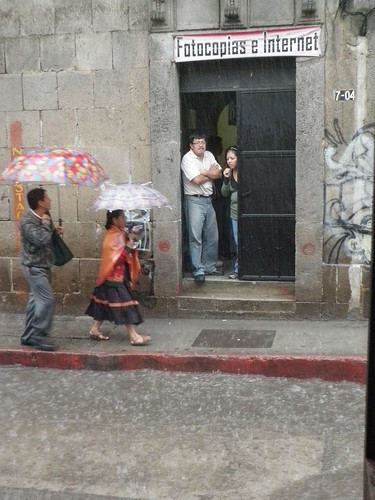
A typical Xela afternoon.
In terms of how my Spanish is doing, I would say it has progressed well. It is hard to quantify, but I can say that am catching more and more of my family's conversation (which is at real-person speed), my teacher and I don't speak English anymore, and I was successfully able to explain what my "We Do What?!" t-shirt meant last week.
Besides studying a whole bunch last week, I did a few fun things:
I went to salsa lessons with friends. No pictures and not much of a story, but really fun by the end. I'm planning on going once a week.
I also attended the weekly school dinner. No one volunteered to cook this week, so we had Dominos. Whomp. If you're wondering, it tastes exactly the same down here, except 1. you eat it with salsa dulce (ketchup), which is kind of tasty; 2. the ham slices are actually ham slices; and 3. the crushed red chili packets are really spicy. Even so, it was still Dominos (I think even Chinese take-out would've been more interesting). Anyway, the meal was saved by the profuse amounts of Gallo and Cabro we all drank. This Thursday we're having chicken curry cooked by an actual Indian, so I'm looking forward to that.
This weekend I went to the beach. Champerico, to be exact. It is on the Pacific coast of Guatemala, and is a popular destination for highland-dwelling folk to go for a daytrip. Ten of such folk, myself included, went there on Saturday. It was a welcome change to be in a place where you can wear shorts comfortably (Xela usually is in the low 70s, sunny and pleasant in the morning, but with heavy rain every afternoon. Long pants and shirt weather most of the time.). And the water! High 70s, at least. I'm tempted to call it bathwater. It was a lot of fun splashing around in it, but swimming wasn't really possible owing to the insanely dangerous undertow. Standing thigh-deep was asking for it, and this the locals knew: anyone, gringo or not, who went deeper than knee-level was watched closely by them, often with cell phones in hand. This way they were ready to take a picture right after the poor bather was bowled over by a wave, tumbled around underwater, and emerged sans bathing suit bottom or top. I spent a couple hours battling the waves, and survived without any indecent photos being taken, but my sinus did get a good saline flush on several occasions.

The beach itself was a bit dirty. It is black sand to start with, and there was a fair amount of discarded coconuts, water bottles and beer cans strewn about. But this was made up for by the groups of boys ambling around on horseback. They were fun to watch.
Lunch was an entire red snapper, deep fried, served with salad, fries, and corn tortillas. Delicious! And only $6. Voila:

****
Although my days last week were spent studying with friends and a doing a bunch of fun activities, the nights have been a different story. I've not been sleeping well at all. There are two reasons for this:
1. Chinches. You know them as bedbugs. From what I can tell, it is a relatively not-talked-about problem in Guatemala. Ask a teacher or your host mom and you're likely to get a puzzled look (my teacher: "chin-que?") or a staunch denial (a friend's host mom: "you don't have bedbugs, you're just allergic to pork"), but almost half of the students I've talked to here have bedbugs. Show a fellow student your itchy bites and most will inevitably say something to the effect of, "I have those too!" Fortunately for me, my host mom was familiar with bedbugs, although she says it is only a problem with the students and that her family has never had a problem. Her theory is that bedbugs like gringo blood better; my theory is that students tend to be a more mobile population and are more likely to come in contact with them, thus spreading them from bed to bed.
Unfortunately, I confirmed last week that my bed has them. It took me several weeks to be sure because one of the hostels I stayed in at the beginning of my trip also had them really bad, so when I arrived in Xela I already had about a dozen bites on me. The bites last for weeks, so when in the first week I noticed another two or three bites I wasn't sure if they were new, or if they were bites from the hostel which I'd missed on the first inspection. The second week I didn't get any new bites, so I was cautiously optimistic that I'd lucked out and been given a chinche-free family. But last week it seems the bedbugs decided it was Thanksgiving and I was the turkey, because I've gotten another dozen bites since. It has not been pleasant. Perhaps the thought of tiny insects living in your bed and feasting on your blood while you sleep doesn't bother you, but it sure as heck bothers me. Consequently, I've been sleeping terribly, and waking up to new itchy bites just makes things worse.
I had to put up with a few days of new bites because I wanted to be sure-sure that I had them before telling my host mom, since saying you were given a bug-infested bed to sleep in isn't something to say without total confidence. She was understanding, and so we're going to try killing the f'ers. To do so, you put all your clothes and sheets in the wash and Raid the heck out of your bed, dresser, bed frame, wall sockets, etc. This is what mi mama and I did this morning. My fingers are crossed that they were living in one of the places we sprayed. If we didn't, they'll be back*.
2. Pollitos. These dudes made my last two nights even worse:

"What the?!", right? These are pollo del dia, and you can buy them in any color imaginable at the market for about Q1 ($0.13).
The sad thing about these guys, as their name suggests, is that they only live for a few days. My host mom claims this is because they're essentially genetic chicken rejects; they can't lay eggs nor will they be especially meaty. Somehow chicken farmers can recognize these guys when they're born. Normally they just kill them. But someone had the (ahem) bright idea that, if you dunk them in a vat of food coloring and market them as novelty children's toys, you could get a few bucks out of them before they died anyway. I'm not quite sure what I think about this yet. I'm curious to hear what y'all think.
Anyway, one of my host sisters bought two pollitos for her son, Rodrico, and for two days and two nights they peeped constantly. The first night they peeped quite vigorously, which made it hard to sleep soundly, which made me wake up more frequently, which made me think about chinches eating me, which made it hard to get back to sleep, etc., etc.
The pink one died quite suddenly on the second day. The green one survived through most of the second night. But, my goodness people, the poor green one suffered a long, rage-against-the-dying-of-the-light kind of death. It peeped right until the end, softer and more slowly as the night wore on. It was horrible to listen to, and it made me cry.
Which brings me to today/this week. I'm tired, but am hopeful I'll be sleeping better shortly. I don't think I'll be going anywhere super exciting this weekend, since I'd like to buckle down and study. Kind of like med school, there's always more to learn :)
*If it becomes apparent the chinches can't be beat I'll change families, but I really, really like my family, and so would like to stay with them if possible, even if that means fumigating my room a couple of times.

A typical Xela afternoon.
Sunday, July 25, 2010
Xelajú Part 2
Week #2 is done, and I have a patchy knowledge of irregular and reflexive verbs to show for it. I felt a lot more satisfied with my studies at the end of last week, but I think this is a function of what I was learning. For example, in the first week I learned to say the following:
“Hello, my name is Becky. I’m 26 years old. I would like that onion. How much does it cost? Thank you, have a nice day.”
And in the second week:
“The soldier distributes rice to the poor people. Then he goes to the bathroom and brushes his hair. He also forgives his sister.”
Sure, it’s nice to know the verb for distributing foodstuffs and supplies. But how often will I be distributing foodstuffs to poor people, and how often will I want to buy an onion? Additionally, when that wacky verb is among a list of hundreds of verbs that you’re supposed to eventually be in command of, it gets a bit overwhelming. But this is me griping and feeling a bit frustrated. I will admit that in that list of verbs there are the useful ones like “to want”, “to think”, “to know”, “to remember”, etc. And I’m starting to use them. About as elegantly as a two year-old, but communication is improving.
What else? Last Tuesday I went on a walk to the cemetery with my teacher. He showed me the tombs of a couple of dictators, as well as a bullet-hole-riddled part of the cemetery wall where the aforementioned dictators used to have people executed.
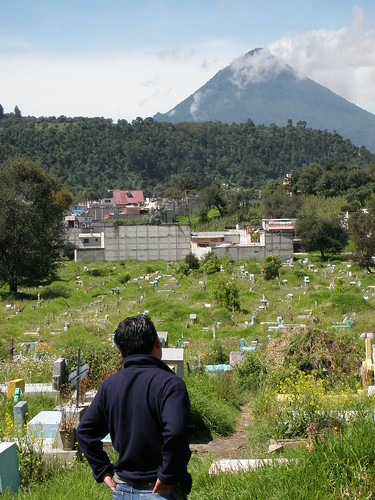
This photo was taken in the tomb- and statue-less half of the cemetery, where poor folk were buried. The volcano Santa Maria is in the background. It was quite peaceful.
I was planning on building stoves on Wednesday, but there isn’t any money to purchase materials for new ones at the moment and all of the half-finished stoves have been completed. So I studied and hung out with my host family instead.
On Thursday I helped out with the school dinner again. I baked brownies, which was no small feat given that the oven’s temperature dial is merely numbered 1 to 5. They turned out pretty tasty, although I don’t know how well they paired with the rest of the meal, which was chicken teriyaki and rice.
I went and saw Shrek 4 en español on Saturday. All I have to say about that movie is, “Meh”. What was interesting, however, was the straight-out-of-the-US food court in the mall the movie theater was in. There was a McDonald's, Taco Bell, Domino’s, Charlie’s Cajun Cookery, New China Express, Subway, Burger King, and a Pollo Campero. What you may not know is that the latter is a Guatemalan company that has since made it "big". Last I checked on their wiki page, they’re in seven different countries, have a headquarters in the US, and have recently partnered with Walmart. I haven’t seen this company in Denver yet, but I have a feeling I will shortly.
On Sunday I toured the coffee plantation "la Dicha" with some folks from school. It was really interesting. Here's a quick lesson: so, coffee grows on trees. The bean itself is inside a berry, which, when ripe, turns from green to yellow to red. For example:
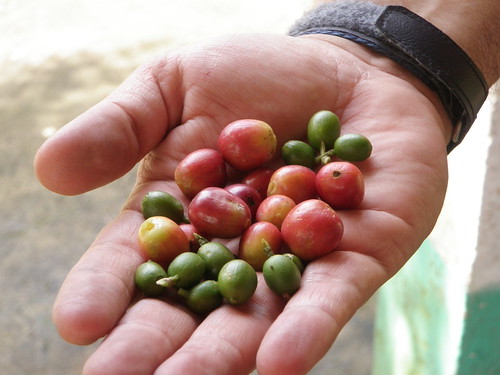
The berries are harvested by hand around October/November in Guatemala, and taken to the processing buildings on the plantation, where the berries are sorted, skinned and depulped, fermented, divided by weight, then dried. After the beans have been dried they're either roasted then distributed, or distributed "green" and roasted elsewhere. As for the quality of coffee produced on these plantations, it turns out that there are twelve grades. The finest, biggest, most flavorful beans (grades 1-3) are the most expensive and are exported to Germany and Japan. Grades 4-12 are sent elsewhere, like the US. The low-end beans are usually what is used for flavored coffee. The worst coffee, the beans that came from the small, unripe, green beans in the above picture, are made into instant coffee, which is (very, very unfortunately) what the majority of Guatemalans drink.
After the plantation tour went on a hike to a secluded lake at the base of Santa Maria. It involved, among other things: 1. Walking across a way-wobbly bridge with questionably sound wooden planks;
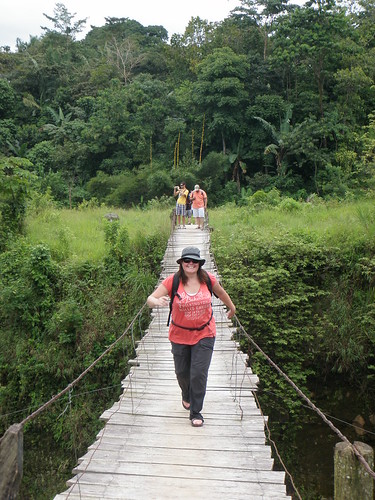
2. crossing a river that was pleasantly warm from being heated by the volcano;
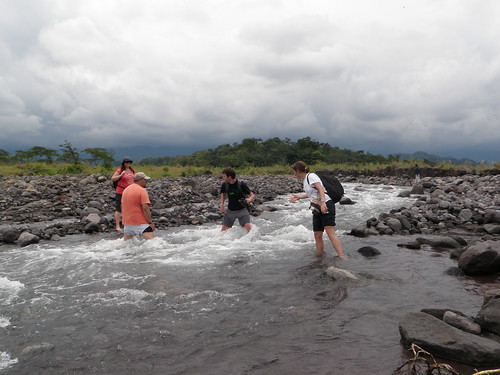
3. hiking through an African savannah-esque prairie; and
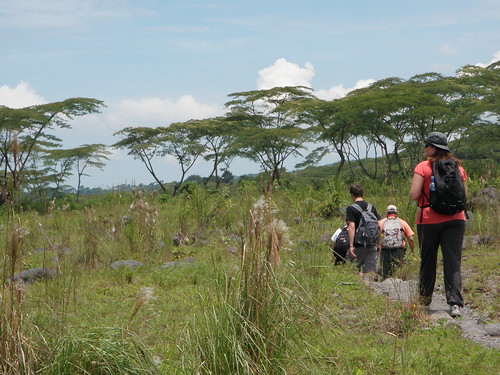
4. ending up at a secluded (also heated) lake at the base of Santa Maria.
Unfortunately, it is the rainy season (also known as winter) here, so the impending afternoon rain was obscuring Santa Maria. Regardless, the hike was really pleasant. Along the way we encountered lots of villagers carrying insanely heavy things with their heads. Like large logs. For example:
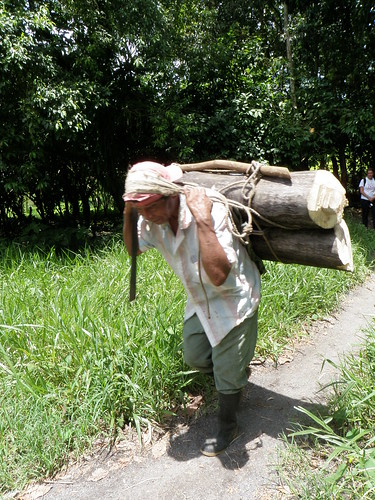
Other things they carried: Bushels of banana leaves. Several children. A couple of swaddled turkeys. Firewood. Bags of cement. I have a feeling this is why neck and back pain are common complaints in the clinic.
We also went ziplining that day, which was quite spiffy, but during this activity those in our party with any exposed skin lost a fair amount of blood to swarms of noseeums, also known as MotherFin' Bloodthirsty Gnats. Horrible.
More photos are posted on Flickr. For now I should get back to studying the past tense. I'll leave you with a photo of how we heat water down here:
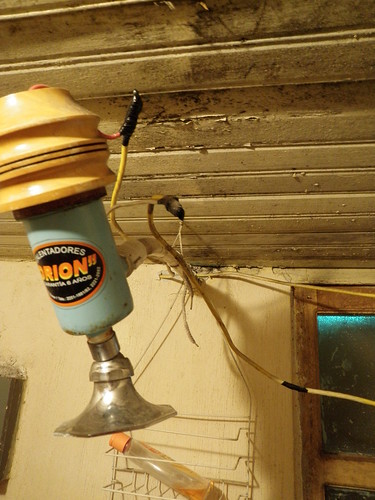
“Hello, my name is Becky. I’m 26 years old. I would like that onion. How much does it cost? Thank you, have a nice day.”
And in the second week:
“The soldier distributes rice to the poor people. Then he goes to the bathroom and brushes his hair. He also forgives his sister.”
Sure, it’s nice to know the verb for distributing foodstuffs and supplies. But how often will I be distributing foodstuffs to poor people, and how often will I want to buy an onion? Additionally, when that wacky verb is among a list of hundreds of verbs that you’re supposed to eventually be in command of, it gets a bit overwhelming. But this is me griping and feeling a bit frustrated. I will admit that in that list of verbs there are the useful ones like “to want”, “to think”, “to know”, “to remember”, etc. And I’m starting to use them. About as elegantly as a two year-old, but communication is improving.
What else? Last Tuesday I went on a walk to the cemetery with my teacher. He showed me the tombs of a couple of dictators, as well as a bullet-hole-riddled part of the cemetery wall where the aforementioned dictators used to have people executed.

This photo was taken in the tomb- and statue-less half of the cemetery, where poor folk were buried. The volcano Santa Maria is in the background. It was quite peaceful.
I was planning on building stoves on Wednesday, but there isn’t any money to purchase materials for new ones at the moment and all of the half-finished stoves have been completed. So I studied and hung out with my host family instead.
On Thursday I helped out with the school dinner again. I baked brownies, which was no small feat given that the oven’s temperature dial is merely numbered 1 to 5. They turned out pretty tasty, although I don’t know how well they paired with the rest of the meal, which was chicken teriyaki and rice.
I went and saw Shrek 4 en español on Saturday. All I have to say about that movie is, “Meh”. What was interesting, however, was the straight-out-of-the-US food court in the mall the movie theater was in. There was a McDonald's, Taco Bell, Domino’s, Charlie’s Cajun Cookery, New China Express, Subway, Burger King, and a Pollo Campero. What you may not know is that the latter is a Guatemalan company that has since made it "big". Last I checked on their wiki page, they’re in seven different countries, have a headquarters in the US, and have recently partnered with Walmart. I haven’t seen this company in Denver yet, but I have a feeling I will shortly.
On Sunday I toured the coffee plantation "la Dicha" with some folks from school. It was really interesting. Here's a quick lesson: so, coffee grows on trees. The bean itself is inside a berry, which, when ripe, turns from green to yellow to red. For example:

The berries are harvested by hand around October/November in Guatemala, and taken to the processing buildings on the plantation, where the berries are sorted, skinned and depulped, fermented, divided by weight, then dried. After the beans have been dried they're either roasted then distributed, or distributed "green" and roasted elsewhere. As for the quality of coffee produced on these plantations, it turns out that there are twelve grades. The finest, biggest, most flavorful beans (grades 1-3) are the most expensive and are exported to Germany and Japan. Grades 4-12 are sent elsewhere, like the US. The low-end beans are usually what is used for flavored coffee. The worst coffee, the beans that came from the small, unripe, green beans in the above picture, are made into instant coffee, which is (very, very unfortunately) what the majority of Guatemalans drink.
After the plantation tour went on a hike to a secluded lake at the base of Santa Maria. It involved, among other things: 1. Walking across a way-wobbly bridge with questionably sound wooden planks;

2. crossing a river that was pleasantly warm from being heated by the volcano;

3. hiking through an African savannah-esque prairie; and

4. ending up at a secluded (also heated) lake at the base of Santa Maria.
Unfortunately, it is the rainy season (also known as winter) here, so the impending afternoon rain was obscuring Santa Maria. Regardless, the hike was really pleasant. Along the way we encountered lots of villagers carrying insanely heavy things with their heads. Like large logs. For example:

Other things they carried: Bushels of banana leaves. Several children. A couple of swaddled turkeys. Firewood. Bags of cement. I have a feeling this is why neck and back pain are common complaints in the clinic.
We also went ziplining that day, which was quite spiffy, but during this activity those in our party with any exposed skin lost a fair amount of blood to swarms of noseeums, also known as MotherFin' Bloodthirsty Gnats. Horrible.
More photos are posted on Flickr. For now I should get back to studying the past tense. I'll leave you with a photo of how we heat water down here:

Wednesday, July 21, 2010
Xela
I'm in Xela, and all's well:
-Spanish Program: Pop Wuj. I chose it for its well-developed medical Spanish program, but it turns out it is pretty swell in general. They do a ton of community outreach: they sponsor a daycare center in a nearby village, and send volunteers there daily; through scholarships they send close to a dozen poor children to elementary school; their medical clinic is darn close to free, and travels to the mountain villages every Wednesday; and they send students up to area villages to build stoves for families who previously cooked their food indoors over an open fire pit. Last Wednesday I went on such a stove-building trip. It was amazing to see how different living conditions are up in the mountains of Xela. Houses are a couple of tiny square rooms with cinder block walls, dirt floors and roofs made of corrugated plastic or tin. If you're well off, your bathroom is an outhouse next to a tiny plot of corn. If you're not, you don't have corn and your bathroom is your neighbor's tiny plot of corn. Chickens, dogs, and turkeys wander the streets, which are worse than any barely used logging road in Colorado that I've been down. Unfortunately, I didn't have time to get any good photos of the village, but I got a couple of the stove my group was working on. They're posted on Flickr.
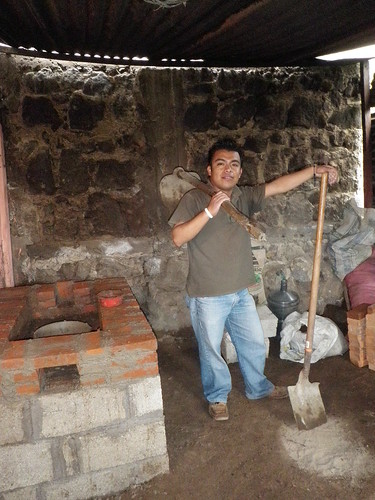
That's my teacher Ulises next to our half-completed stove; he's about my age and is getting something like a masters in economics and business at the university. The stove he's standing next to is 2/3rds done. The base is a cinder block rectangle filled with dirt to hold heat, the upper layers are brick held together with concrete on the outside and clay on the inside. Next week we'll put a few more layers of brick on, then top it with a stone slab with a central metal plate where the "burners" are. Add a small metal chimney tube out the back, and voila! a cheap, safe, fuel-efficient wood-burning stove. I'll be back to build more for sure, but at the moment we're running low on funding to buy material for new stoves, and the funding comes entirely from donations from the States *nudge*. If any of you are interested in making a donation, it costs $125 for the materials to build one stove. Contact me if you're interested. For more information on all of Pop Wuj's community development projects, go here.
-Class: Great. Five hours of one-on-one instruction with Ulises Monday through Friday. My class is from 8am-1pm, which is usually spent learning crazy amounts of vocabulary and chatting in broken Spanish. Afternoons are typically spent studying and running errands around the city with friends.
-My Spanish: In one week of instruction (really only three days, since Monday morning was orientation, stove-building day was a bit of a wash, and I spent all of Thursday afternoon baking cookies instead of studying) my Spanish has progressed like, woah. It is still totally, utterly broken, but I can at least buy produce from street vendors without wanting to cry afterward, and can explain to my host mom what I'm going to be doing tomorrow. The latter is really amazing, because on Monday all I could basically say to her was a word salad of hola/si/no/gracias/por favor/me gusta/yo quiero/bueno/agua/hasta la vista, baby. Likewise, my vocabulary has gone from about 25 words to at least 300, although turning those words into sentences is still really, really dicey. But, gosh, all of this in three days! It makes me excited to think about how I'll be doing /six months/ from now.
-My host family: One mom (Lucrecia), five daughters (Cindy, Michelle, Jessica, Cathy, Mari), one dog (Luna), one cat (Sol), one grandma (haven't figured out her name yet), and one grandson (Rodrico). Michelle and Mari are studying to be doctors. Cindy is a lawyer, and Cathy's studying to be one. I'm not sure about Jessica, but she's in a Catholic high school. Luna is a puppy beagle, and likes to eat my earplugs. Sol is a tiny little white cat with a large wound on the back of her neck, courtesy of Luna, who hasn't quite figured out how to operate her mouth and paws. Grandma is the epitome of what I think a grandma should be: stout, long silver hair in a braid, kind eyes, leathery face, bad hips. She is always telling stories, but in a really thick accent, so I can only make out about one-in-fifty words. Unfortunately, when she introduced herself to me and started chatting, that one-in-fifty word I can catch was not her name. Whoops.
Dad is a trucker based somewhere in New Jersey. He sends money each month, which is the family's primary income. It sounds like he hasn't been able to come back home for six years or so.
I'll write more about my host family, the house, the food, Pop Wuj, and life in Guatemala in the next post. For now I'll leave you with a picture taken during the prep for dinner on Thursday. We cooked/baked for 70 folks, mostly from the Timmy Foundation, who donate medical supplies and send medical volunteers to help in our clinic. We made guacamole, pico de gallo, corn bread, chili, and cookies. Everything turned out great.
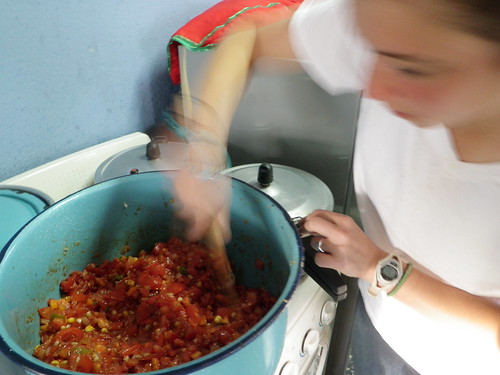
-Spanish Program: Pop Wuj. I chose it for its well-developed medical Spanish program, but it turns out it is pretty swell in general. They do a ton of community outreach: they sponsor a daycare center in a nearby village, and send volunteers there daily; through scholarships they send close to a dozen poor children to elementary school; their medical clinic is darn close to free, and travels to the mountain villages every Wednesday; and they send students up to area villages to build stoves for families who previously cooked their food indoors over an open fire pit. Last Wednesday I went on such a stove-building trip. It was amazing to see how different living conditions are up in the mountains of Xela. Houses are a couple of tiny square rooms with cinder block walls, dirt floors and roofs made of corrugated plastic or tin. If you're well off, your bathroom is an outhouse next to a tiny plot of corn. If you're not, you don't have corn and your bathroom is your neighbor's tiny plot of corn. Chickens, dogs, and turkeys wander the streets, which are worse than any barely used logging road in Colorado that I've been down. Unfortunately, I didn't have time to get any good photos of the village, but I got a couple of the stove my group was working on. They're posted on Flickr.

That's my teacher Ulises next to our half-completed stove; he's about my age and is getting something like a masters in economics and business at the university. The stove he's standing next to is 2/3rds done. The base is a cinder block rectangle filled with dirt to hold heat, the upper layers are brick held together with concrete on the outside and clay on the inside. Next week we'll put a few more layers of brick on, then top it with a stone slab with a central metal plate where the "burners" are. Add a small metal chimney tube out the back, and voila! a cheap, safe, fuel-efficient wood-burning stove. I'll be back to build more for sure, but at the moment we're running low on funding to buy material for new stoves, and the funding comes entirely from donations from the States *nudge*. If any of you are interested in making a donation, it costs $125 for the materials to build one stove. Contact me if you're interested. For more information on all of Pop Wuj's community development projects, go here.
-Class: Great. Five hours of one-on-one instruction with Ulises Monday through Friday. My class is from 8am-1pm, which is usually spent learning crazy amounts of vocabulary and chatting in broken Spanish. Afternoons are typically spent studying and running errands around the city with friends.
-My Spanish: In one week of instruction (really only three days, since Monday morning was orientation, stove-building day was a bit of a wash, and I spent all of Thursday afternoon baking cookies instead of studying) my Spanish has progressed like, woah. It is still totally, utterly broken, but I can at least buy produce from street vendors without wanting to cry afterward, and can explain to my host mom what I'm going to be doing tomorrow. The latter is really amazing, because on Monday all I could basically say to her was a word salad of hola/si/no/gracias/por favor/me gusta/yo quiero/bueno/agua/hasta la vista, baby. Likewise, my vocabulary has gone from about 25 words to at least 300, although turning those words into sentences is still really, really dicey. But, gosh, all of this in three days! It makes me excited to think about how I'll be doing /six months/ from now.
-My host family: One mom (Lucrecia), five daughters (Cindy, Michelle, Jessica, Cathy, Mari), one dog (Luna), one cat (Sol), one grandma (haven't figured out her name yet), and one grandson (Rodrico). Michelle and Mari are studying to be doctors. Cindy is a lawyer, and Cathy's studying to be one. I'm not sure about Jessica, but she's in a Catholic high school. Luna is a puppy beagle, and likes to eat my earplugs. Sol is a tiny little white cat with a large wound on the back of her neck, courtesy of Luna, who hasn't quite figured out how to operate her mouth and paws. Grandma is the epitome of what I think a grandma should be: stout, long silver hair in a braid, kind eyes, leathery face, bad hips. She is always telling stories, but in a really thick accent, so I can only make out about one-in-fifty words. Unfortunately, when she introduced herself to me and started chatting, that one-in-fifty word I can catch was not her name. Whoops.
Dad is a trucker based somewhere in New Jersey. He sends money each month, which is the family's primary income. It sounds like he hasn't been able to come back home for six years or so.
I'll write more about my host family, the house, the food, Pop Wuj, and life in Guatemala in the next post. For now I'll leave you with a picture taken during the prep for dinner on Thursday. We cooked/baked for 70 folks, mostly from the Timmy Foundation, who donate medical supplies and send medical volunteers to help in our clinic. We made guacamole, pico de gallo, corn bread, chili, and cookies. Everything turned out great.

Subscribe to:
Posts (Atom)